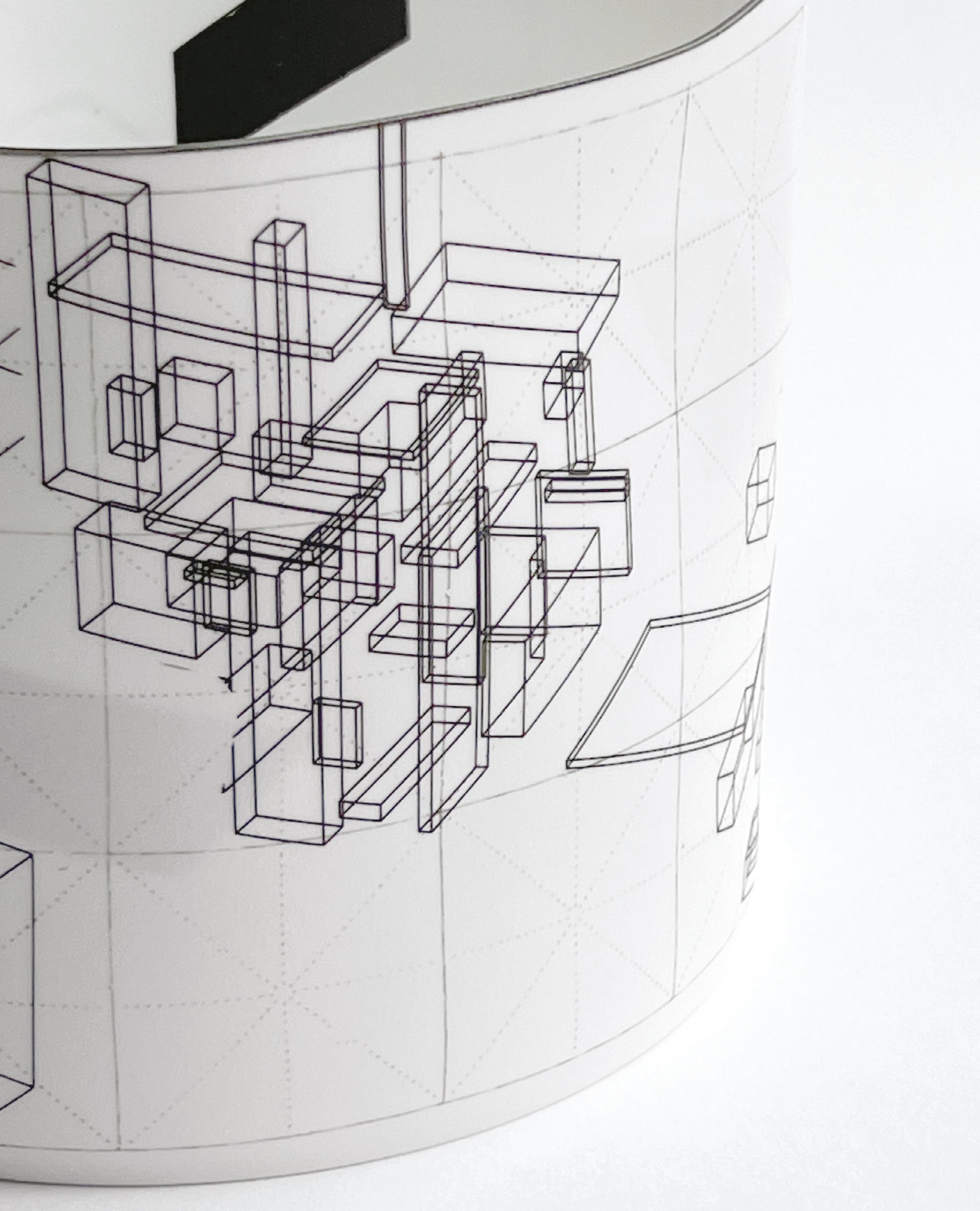BODIL MANZ AT
80





27 July - 26 August 2023

scottish-gallery.co.uk/bodilmanz

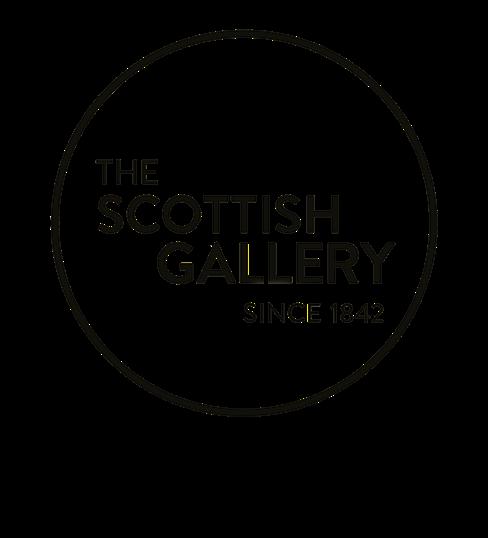

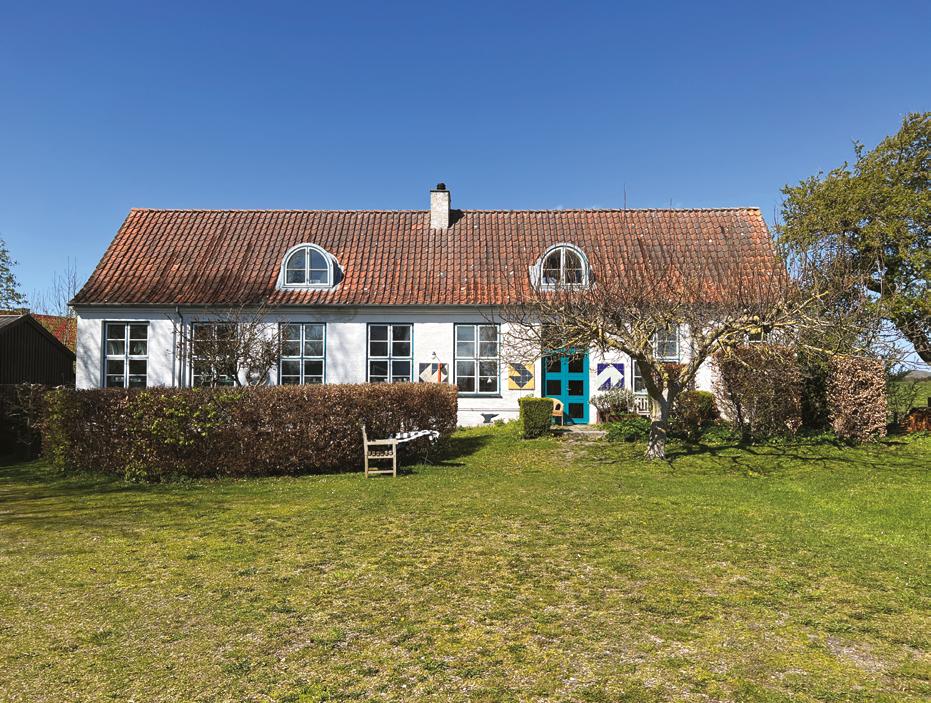
Bodil Manz at 80 celebrates the world renowned Danish ceramist, who has exhibited with The Scottish Gallery for over thirty years and who forms part of our Wonder Women series this Festival. Manz has achieved international status for her wafer-thin slip cast porcelain cylinders. Her seemingly fragile, ethereal creations, seductive in
I love working with ceramics. Working with and exploring what I can do with clay is a lifelong process which never stops. A ceramic artist once said: ‘We are romantics of material’ – the material seduces us. In recent years I have been working on a very simple cylinder in porcelain where the transparency of the body allows the light to show the compositions made up by decorations both on the inside and on the outside of the cylinder. To me the cylinder is like a sheet of paper on which I can do different things depending on where I am in life. That is why I do not get fed up with them. The excitement I feel is what keeps me going. The outcome of my experiments with the material. If I have a beautiful glaze or clay, then the ideas of how to use it will pop up. And things happen in life. Everyday life, a trip away, my garden, people around me. Those are the things that inspire me. The privilege of being an artist is that the work never stops. It is always there.
 Bodil Manz
Bodil Manz
their visual poetry and harmony, are made with a highly technical and compositional mastery. They are both iconic and a joy to behold. Manz’s dedicated studio practice has contributed to the elevation and wider understanding of ceramics in recent years and her work is held in numerous public collections worldwide. Manz has held solo exhibitions in Copenhagen, Brussels, Amsterdam, London, New York and in 2008 she was honoured with a major retrospective at the Designmuseum Denmark in Copenhagen. More recently, she was shortlisted as one of the finalists for the LOEWE craft prize in 2021.
It is a privilege and honour for The Scottish Gallery to celebrate her 80th year, which will be followed by a full retrospective of her work in Copenhagen in 2024. Manz has made a new series for this exhibition, where she continues to explore the cylinder form alongside five abstract artworks.
Facing page: Bodil Manz in her studio, Hørve, Denmark, 2023, photo: Erik Brahl Above and right: Bodil Manz’s studio
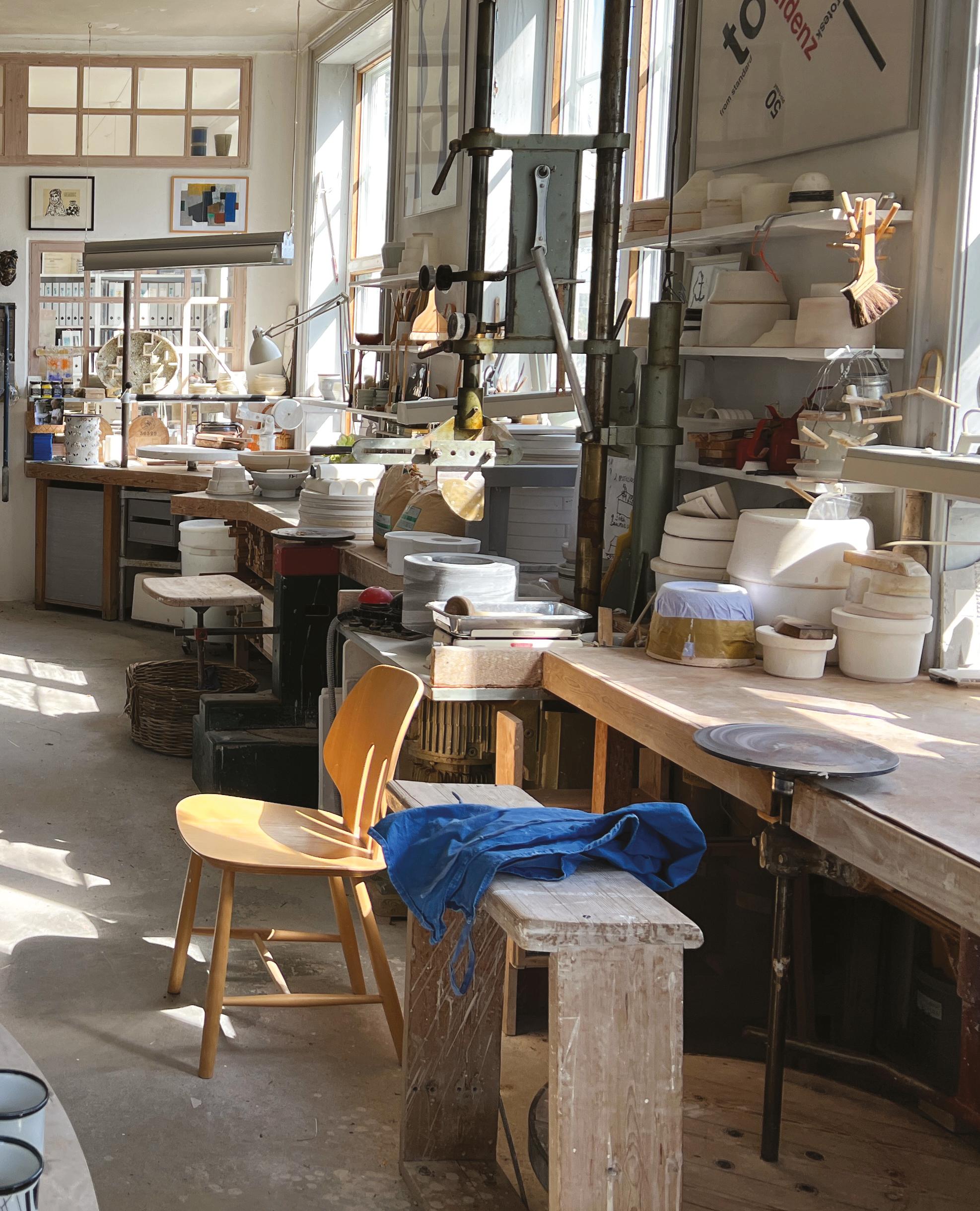
Bodil Manz was born in Copenhagen in 1943 and her career in studio ceramics spans a lifetime. Manz spent childhood summers in Vindekilde, Denmark, collecting clay by the cliffs on the beach, an activity that heavily influenced her early interest in ceramics.

Clay is something very fundamental to a ceramist. I hardly think I could live without it. Suppose you gave up doing these things because you were growing old, I don’t think you’d ever forget them. You never would. Physically, it also means a great deal. As a child I walked about in the blue clay in Bjergene, where it was
States to study art at the University of California, Berkeley, under Peter Voulkos (1924-2002) and at the Escuela de Disneño y Artesanias in Mexico. Manz found that the experience of the radically different way of thinking and working that was practised in Voulkos’s department made her realise that a ceramist does not need to strive to achieve a ‘timeless’ expression, as was taught in the Arts and Crafts School, but that the ceramic art is linked to its time just like any other artistic activity. Peter Voulkos’s farewell words to Bodil and Richard were that they should go home and discover their own personal position as ceramists. The Manzs returned to Denmark in 1967 and opened a workshop in the town of Hørve. Here, Manz began her ongoing exploration of the ceramic cylinder.
on the shore; it went right down between the stones where we knew there were some places with clay. We simply went sloshing around in it. Clay is different from soil. Soil, gravel and sand have their individual character, but clay binds things together, it holds things together. That’s the very first thing you discover when you make a lump - it stays there. That’s fascinating in itself. The first bowls I made were just the same as when, as a little child, you could put your thumb down in it and then a little hole formed.
Bodil ManzFrom 1961-1965 Manz was enrolled at the Arts and Crafts School in Copenhagen, where she met her future husband and ceramic artist, Richard Manz (1933-1999). In 1966, they travelled to the United
Bodil Manz’s studio is situated in the old school in Starreklinte, surrounded by the landscape of Odsherred in Zealand, which is close to Dragsholm Castle and Vallekilde Folk High School. Here, together with her husband, their combined studio practice became part of a Danish porcelain tradition and language. This close artistic partnership lasted until her husband’s passing in 1999. Over the past four decades, Bodil Manz has concentrated on paper models, slip casting and honing her slip cast, porcelain cylinders.
 Left: Details from the studio
Right: The cutting and decorating table
Left: Details from the studio
Right: The cutting and decorating table
And now I’m working on what I have worked on for many years - thin cylinders. I have really specialised in this and worked my way into it, and I feel that as a great joy. It may be that some people wonder how I can go on and on. But with me it’s that I go on as long as I find it interesting. As things are now, I think it can go on for ever.
Bodil ManzThe deceptively simple cylinder is the vehicle for Bodil Manz’s art. Casting porcelain slip to create delicate semi-transparent vessels, Manz has spent a lifetime exploring the cylinder form. Sometimes the finest of lines are traced and revealed across the inner and outer surface, and in other works solid blocks of colour, reminiscent of the palette of Soviet painters of the twenties, provide geometric counterpoints to the delicacy of form and material. Manz’s work is often inspired by translating the patterns and shapes of objects (domestic or industrial) from the studio or her home. Other patterns emerge from observing the surrounding landscape or in response to a place; the possibilities of abstraction are endless for Manz and the subtle

refinement reflects the dedication to her craft and continued dialogue and interest in her subject. Her work is architectural and speaks of the nature of structure and form and the end result is at once personal and universal.
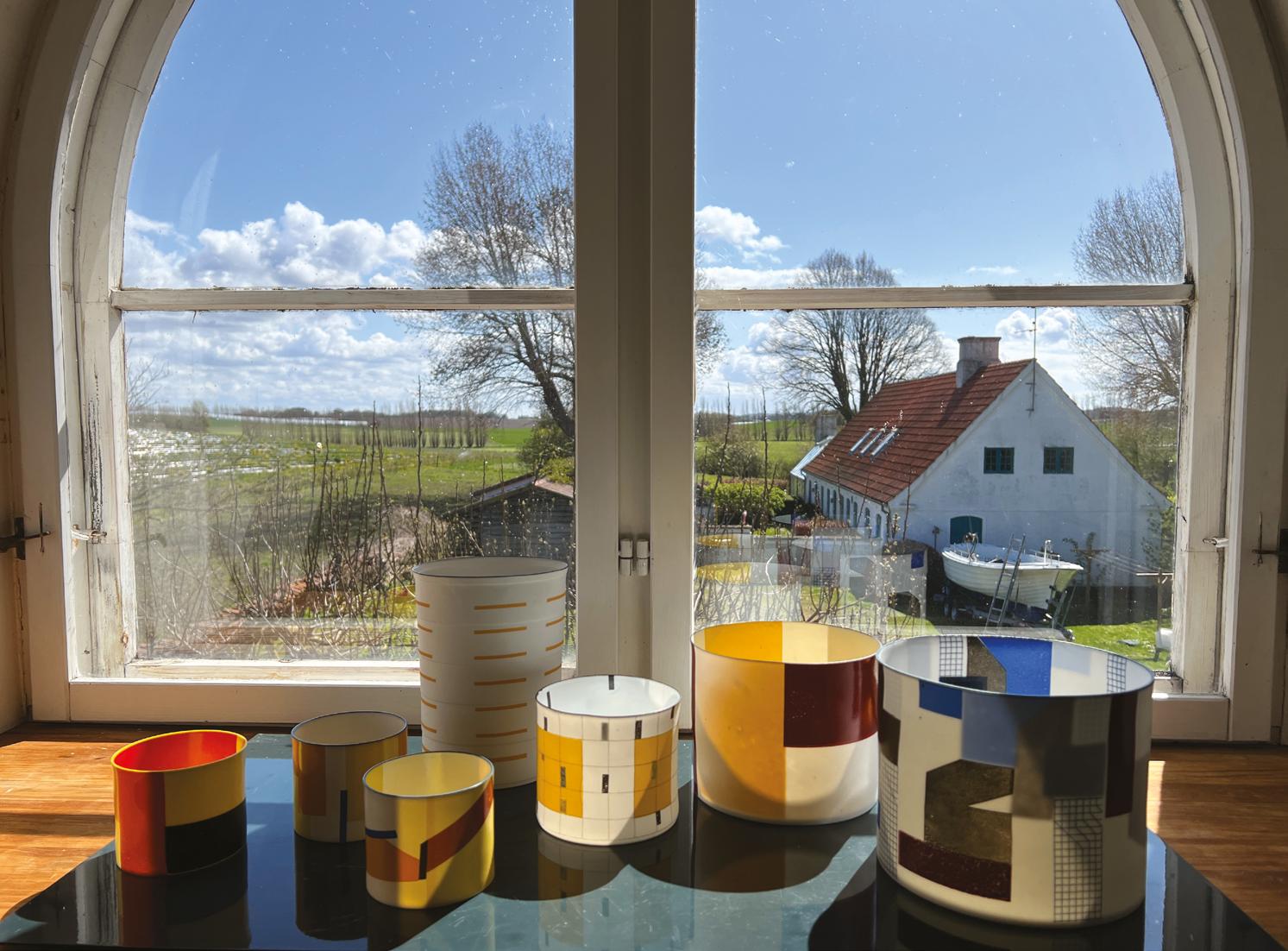 Above: Sunlight streaming through cylinders in Bodil Manz’s studio Right: Autumn (cat. 25), Summer (cat. 19), Colour 1 (cat. 20), 2023
Above: Sunlight streaming through cylinders in Bodil Manz’s studio Right: Autumn (cat. 25), Summer (cat. 19), Colour 1 (cat. 20), 2023
Nature… means everything. Simply everything! The things I make with geometrical lines are very graphic, you might say that nature’s not all that easy to find in those forms, but for me it’s simply so closely tied to nature. And it’s got something to do with the light... Every day while I’m working, I’m constantly darting in and out. I look out of my windows; I must see all the time. It’s very - oh I don’t know how to put it - but nature is completely indispensable to me. I’ve become such a countrywoman. Bjergene and my childhood. They are inseparable. Bodil Manz
The thin porcelain cylinder shape starts with a plaster mould, which is a technically delicate process. The porcelain mixture is a precise measurement of clay, water and electrolyte. The liquid porcelain is then poured into the mould and immediately poured out again, leaving a thin layer
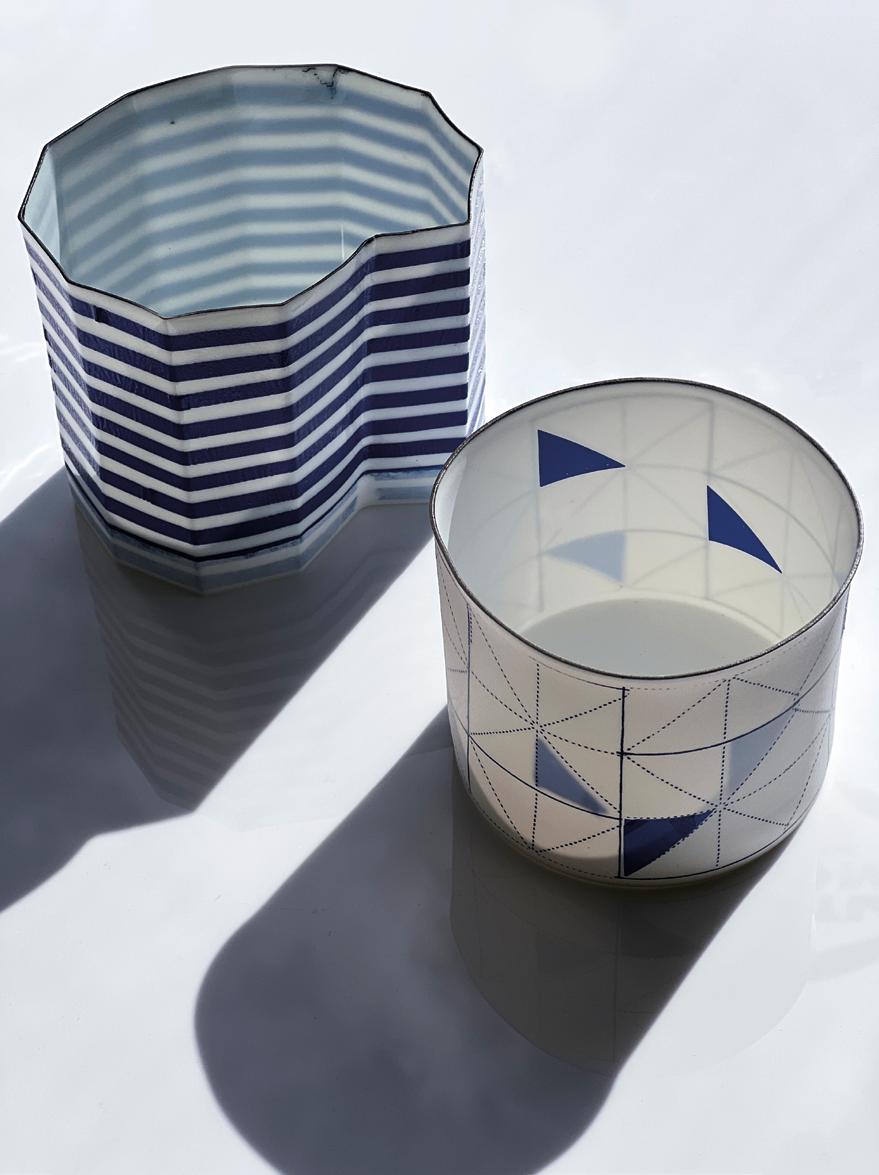

on the sides and bottom of the mould. The plaster then absorbs the water from the mixture. The thickness of the wall depends on how long the plaster mould is allowed to absorb. When the cylinder is loosened from the mould, it is carefully removed and after drying it is first fired at 900
degrees, after which it is glazed with a matt white glaze and fired at 1300 degrees. The decoration can then be added. Manz works on paper models to work out what patterns are going to work on the cylinders, and which coloured foils she is going to work with. The different parts of the decoration are cut out and dabbed with water onto the cylinder, which is then fired at a high temperature (1300 degrees) so that the decals sink into the wall. The firing of the cylinders takes place in several stages.
All of us who have handled Bodil’s thinly cast porcelain pots for the first time share the same experience, a moment of utter disbelief. The absence of weight is surprising, even shocking and above all, it is gravity defying. For a moment the laws of physics are suspended, part of the hands-on, tactile wonderment of her art. Garth Clark, 2008
Left: Cylinder moulds; Right: Sunlight streaming through Blue Stripes (cat. 10), Korea IV (cat. 6) Facing page: Bodil Manz turning at the wheel in her studio in Starreklinte, Denmark, 1968, photo: Steen Rasmussen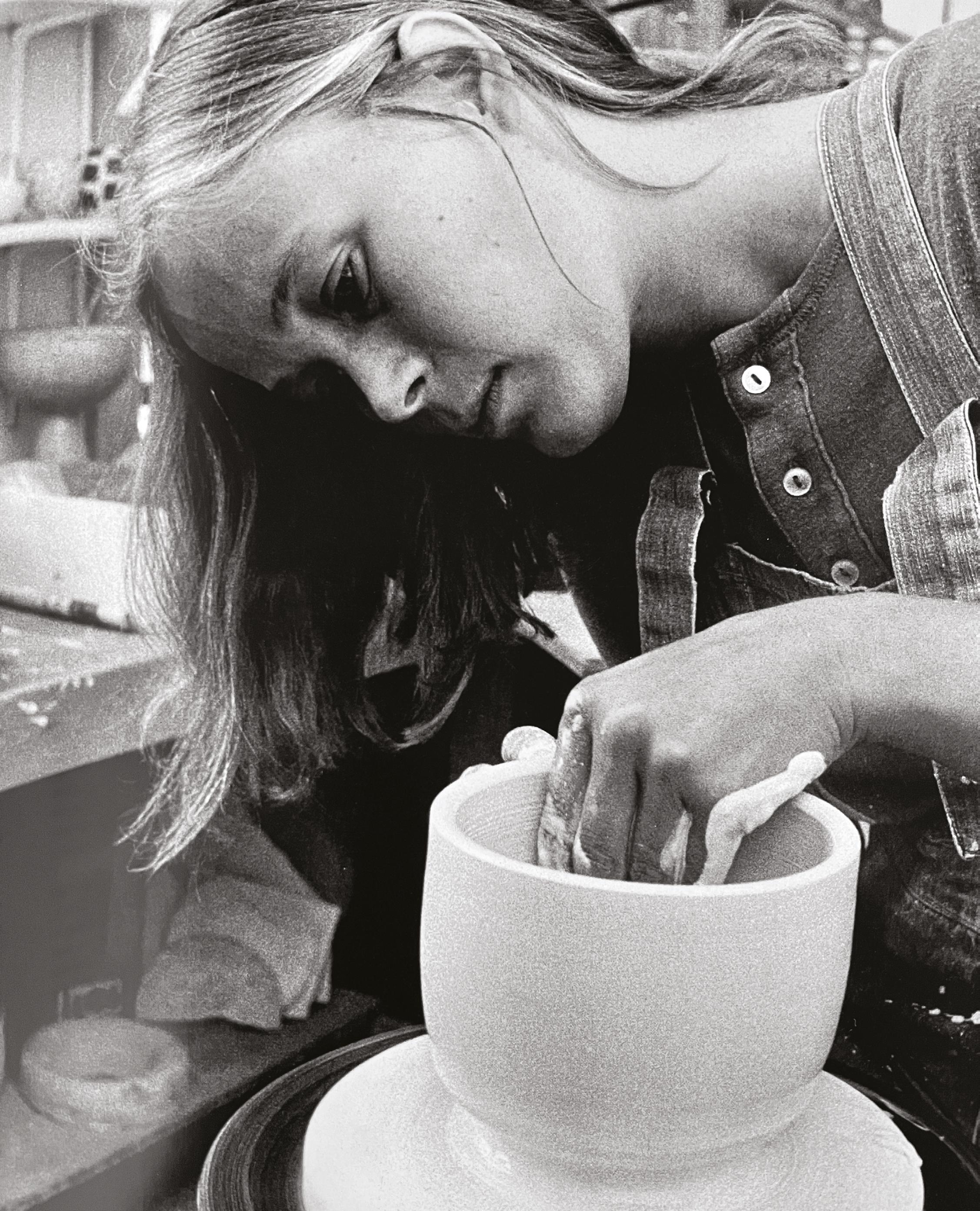
From the 1990s, Bodil Manz began making flat reliefs using handmade paper and these form an integral aspect of her studio practice. There are five paper artworks in the exhibition (cat. 37-40). The paper relief is coloured with ceramic elements which includes: ash, sand and clay, and oxides such as manganese, iron, ochre and zinc, which help define the structure, composition, and textural quality of the various surfaces. There is a direct link between her paper reliefs and her porcelain cylinders.
Bodil Manz’s work is synonymous with Denmark’s design culture and her practice continues to inspire artists worldwide. Manz has a very human, pragmatic approach to art, reflecting her experience on this earth, with each new series marking another year.
I would so much like to get into the core, the core, the core, the simplest thing of all. That’s what I’ve been working on these last years. Going as far as is possible, that’s what I fight to achieve, and that’s what I try to do. I work with a very stringent approach; I make a line this way and that way, and then there’s the question of the light, and then it forms a cross. And as for the things I make, people would almost freeze to ice by looking at them if the material were not there. It’s really fired to the limit. Each work represents a risk. But it also means that the human element comes in so that it becomes a bit skewed or something. I think it’s like that with all art, that you don’t just stop where it’s absolutely safe, for then it’s boring, or perhaps it merely becomes superficial, not profound.
Bodil ManzText sources: United and Apart, CLAY (Designmuseum Denmark), 2018

Bodil Manz, The Ceramist, 2008
 The Scottish Gallery
Top: Studio details; Lower: Cylinders displayed in a glass vitrine Facing page: Bodil Manz in her studio, 2023
The Scottish Gallery
Top: Studio details; Lower: Cylinders displayed in a glass vitrine Facing page: Bodil Manz in her studio, 2023
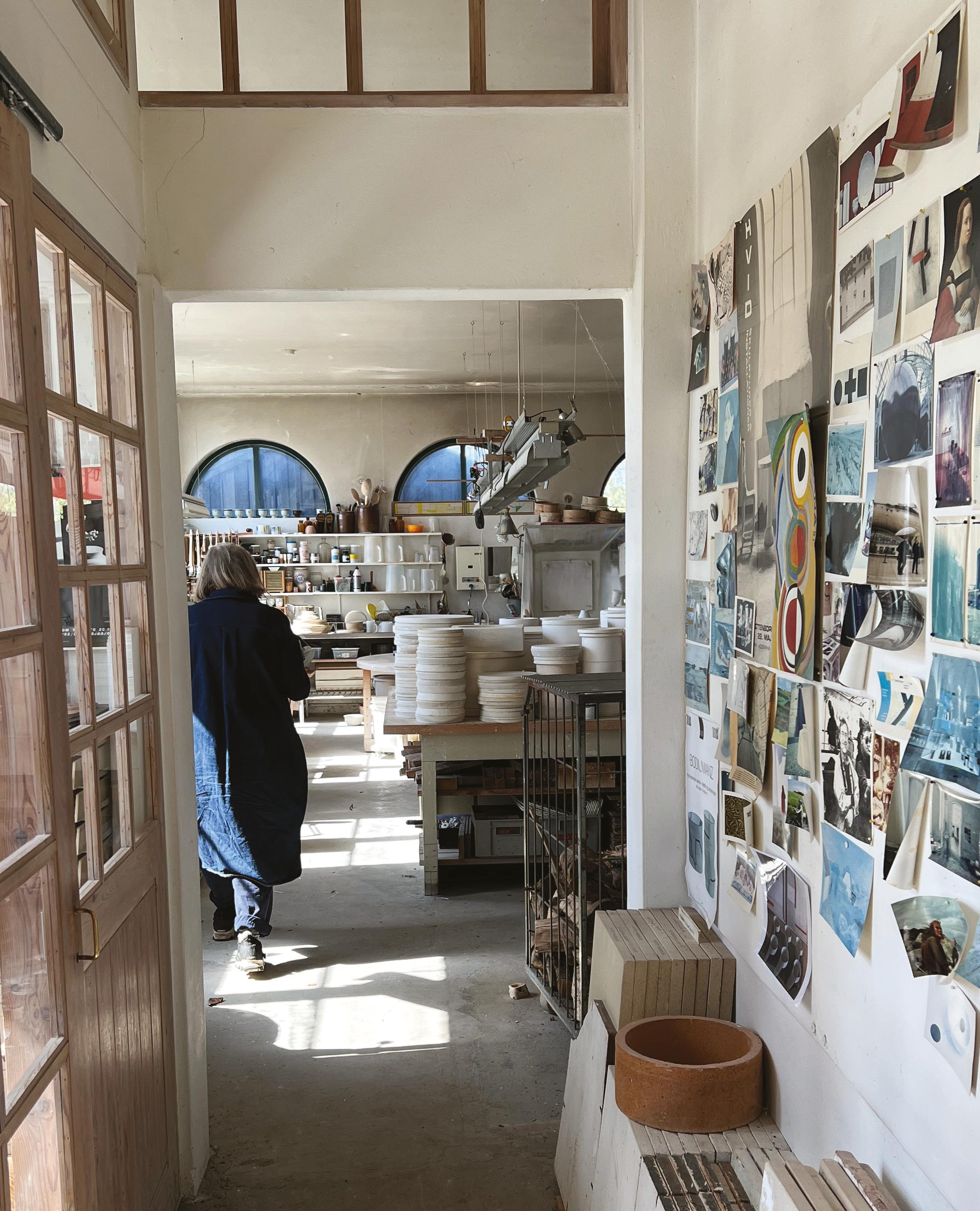
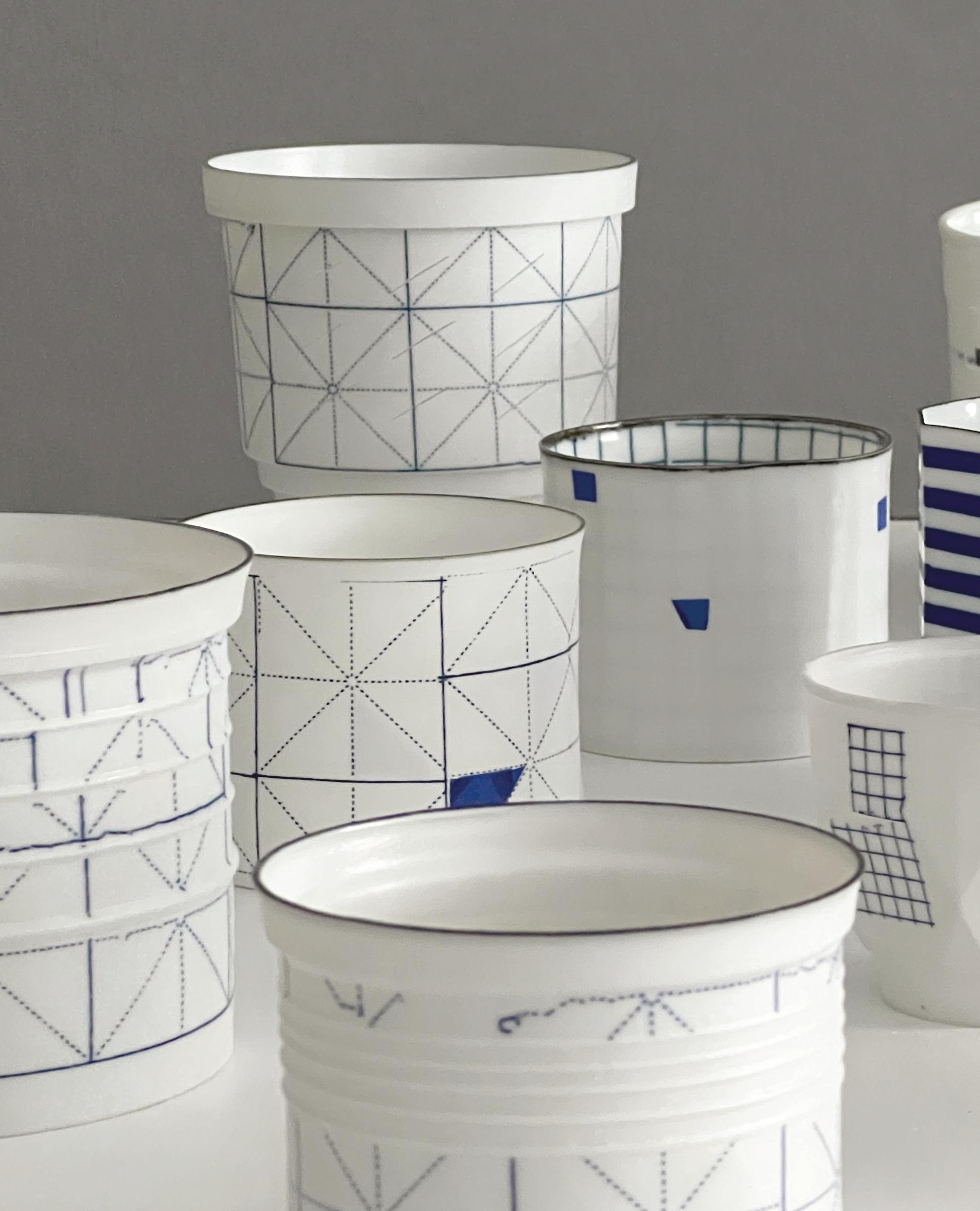
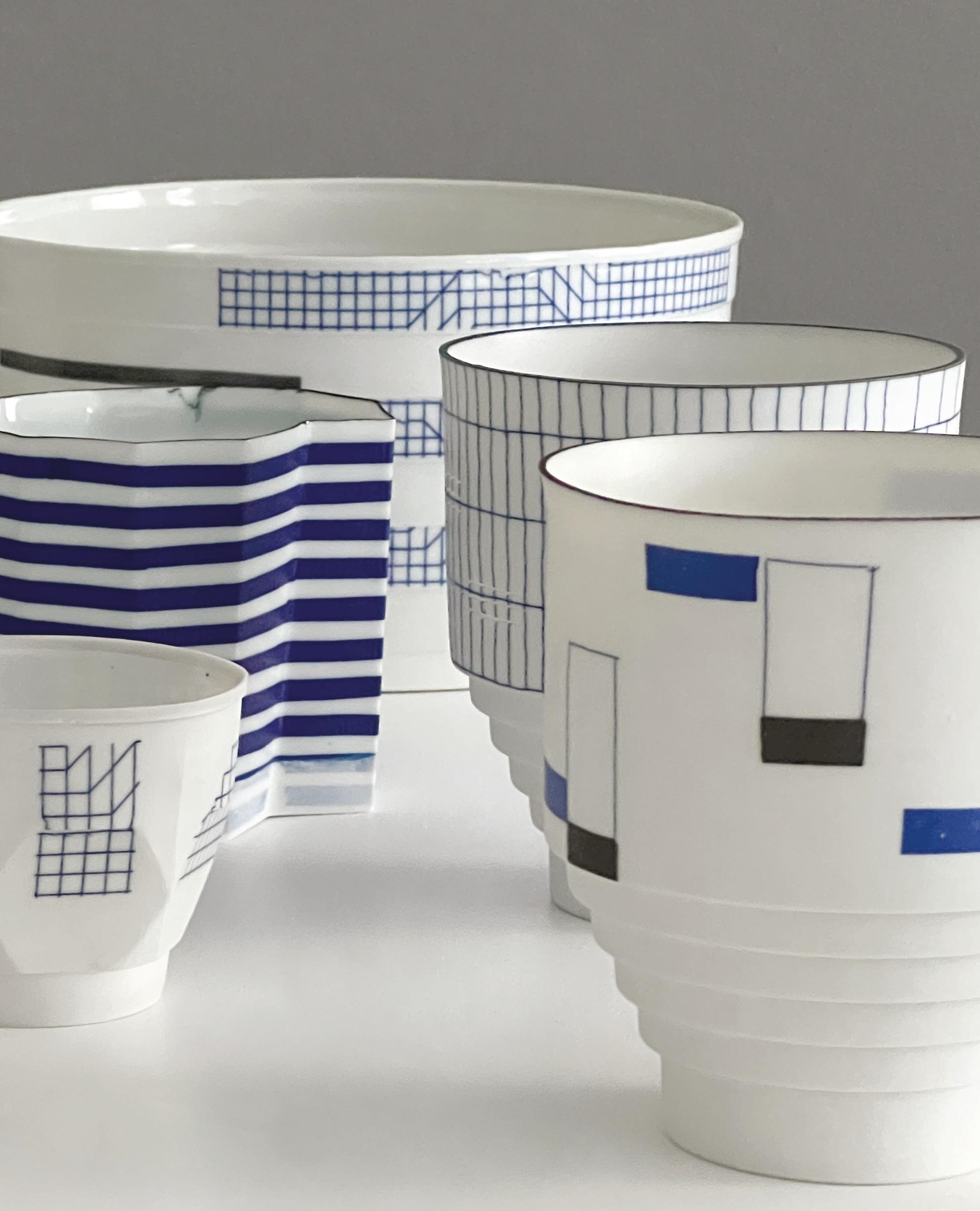
1/ Anchor, 2020
porcelain cylinder no 4
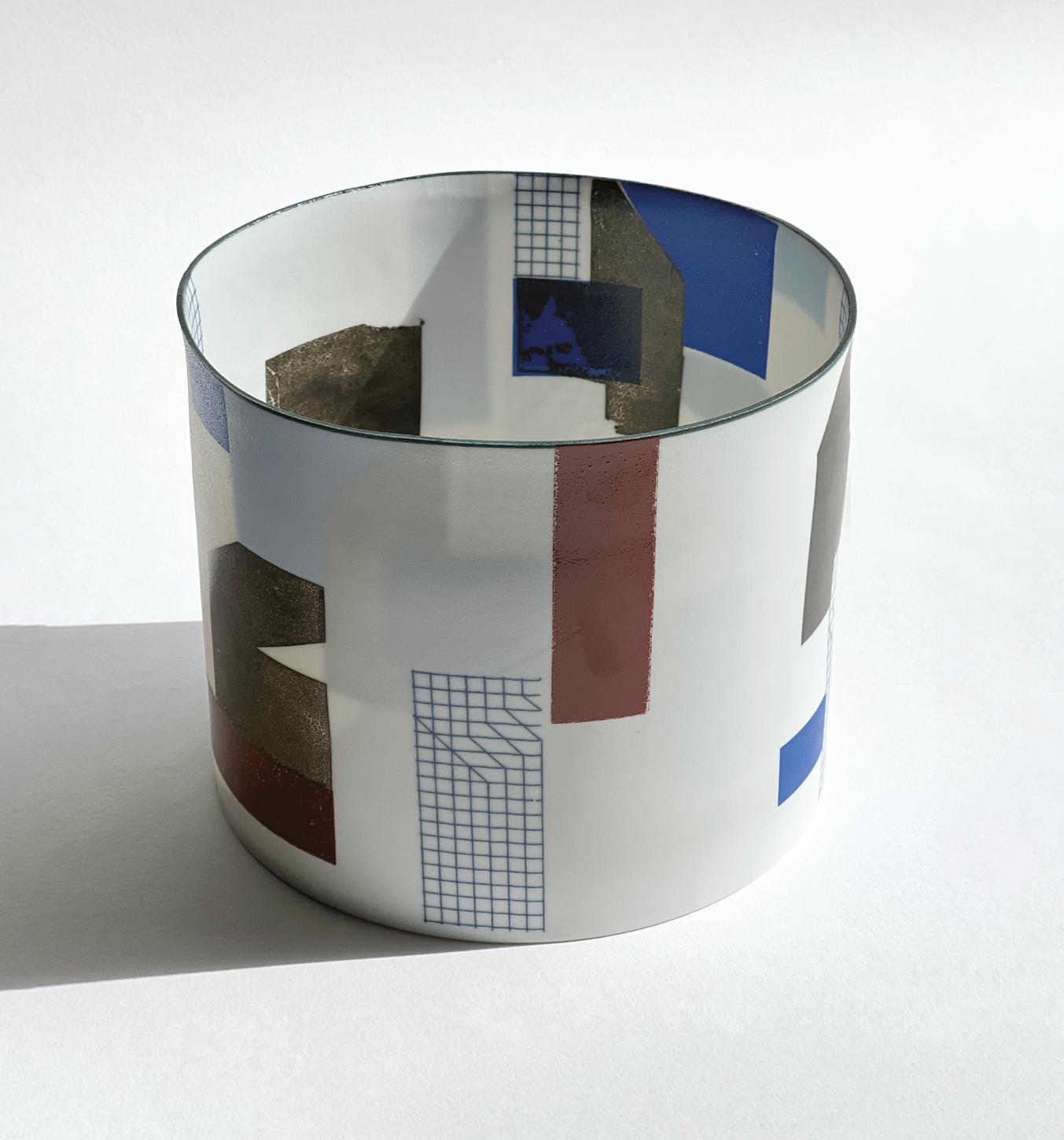
H15 x D18 cm
2/ Net, 2022
porcelain cylinder no 5a
H12 x D22 cm
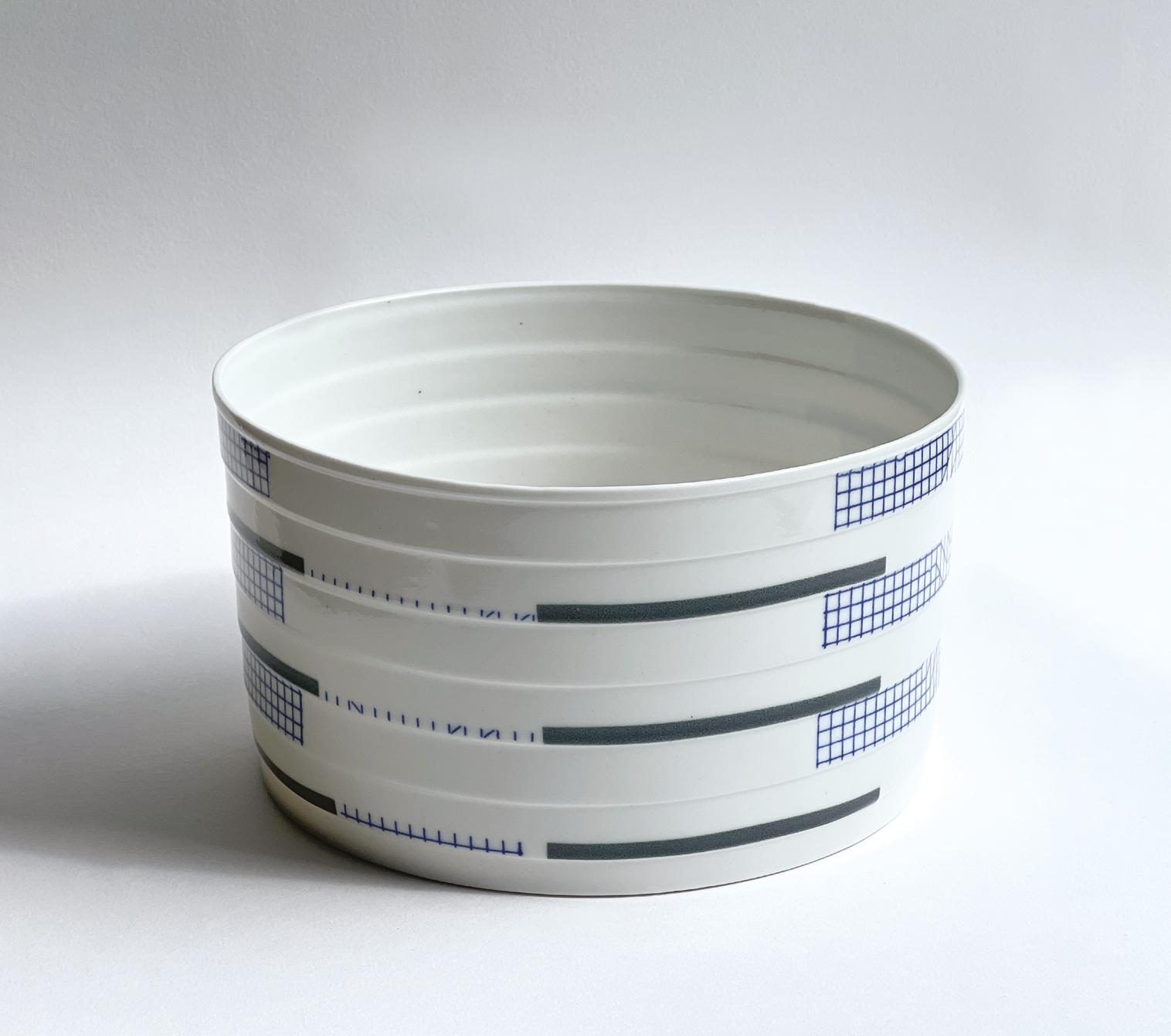
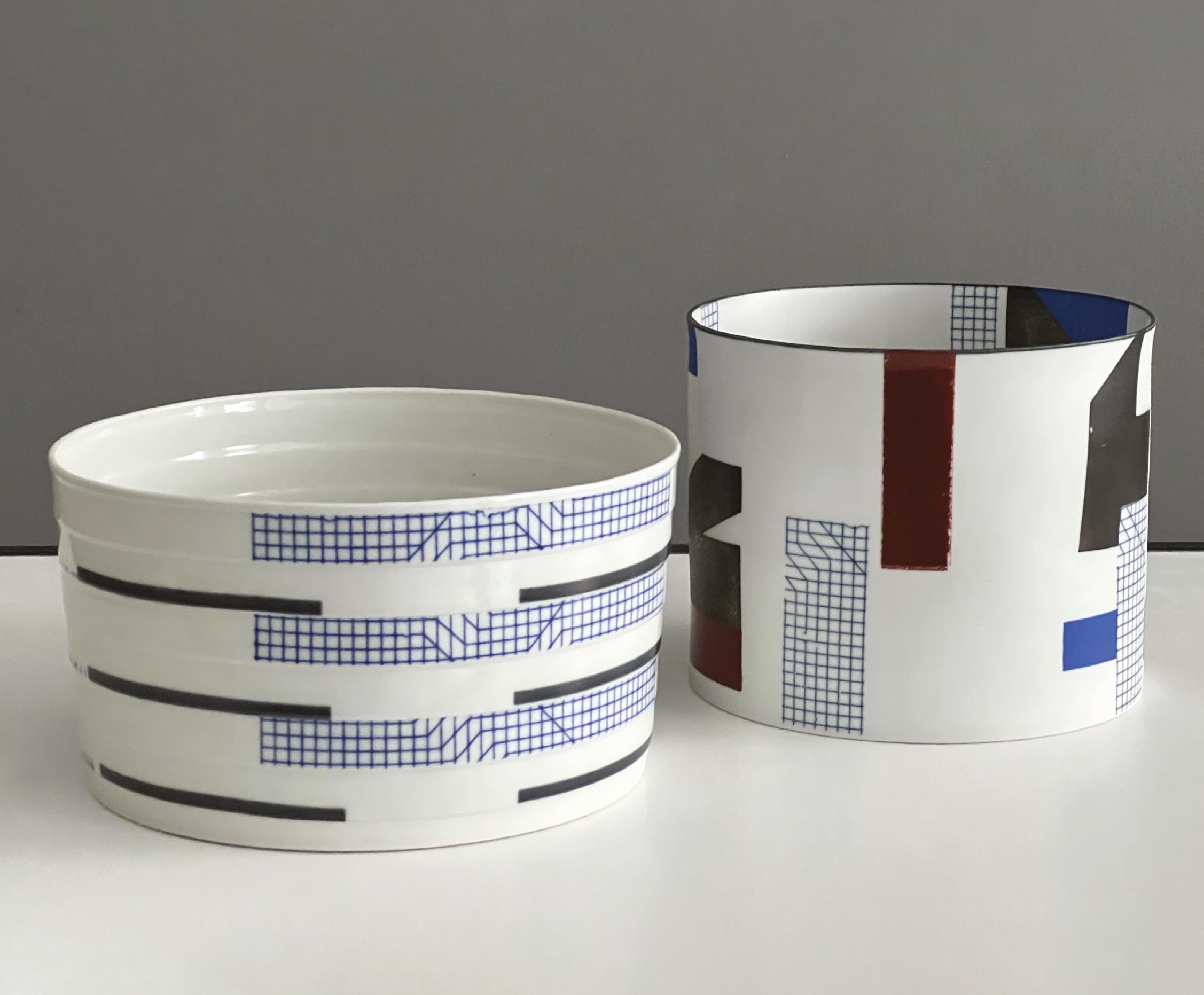
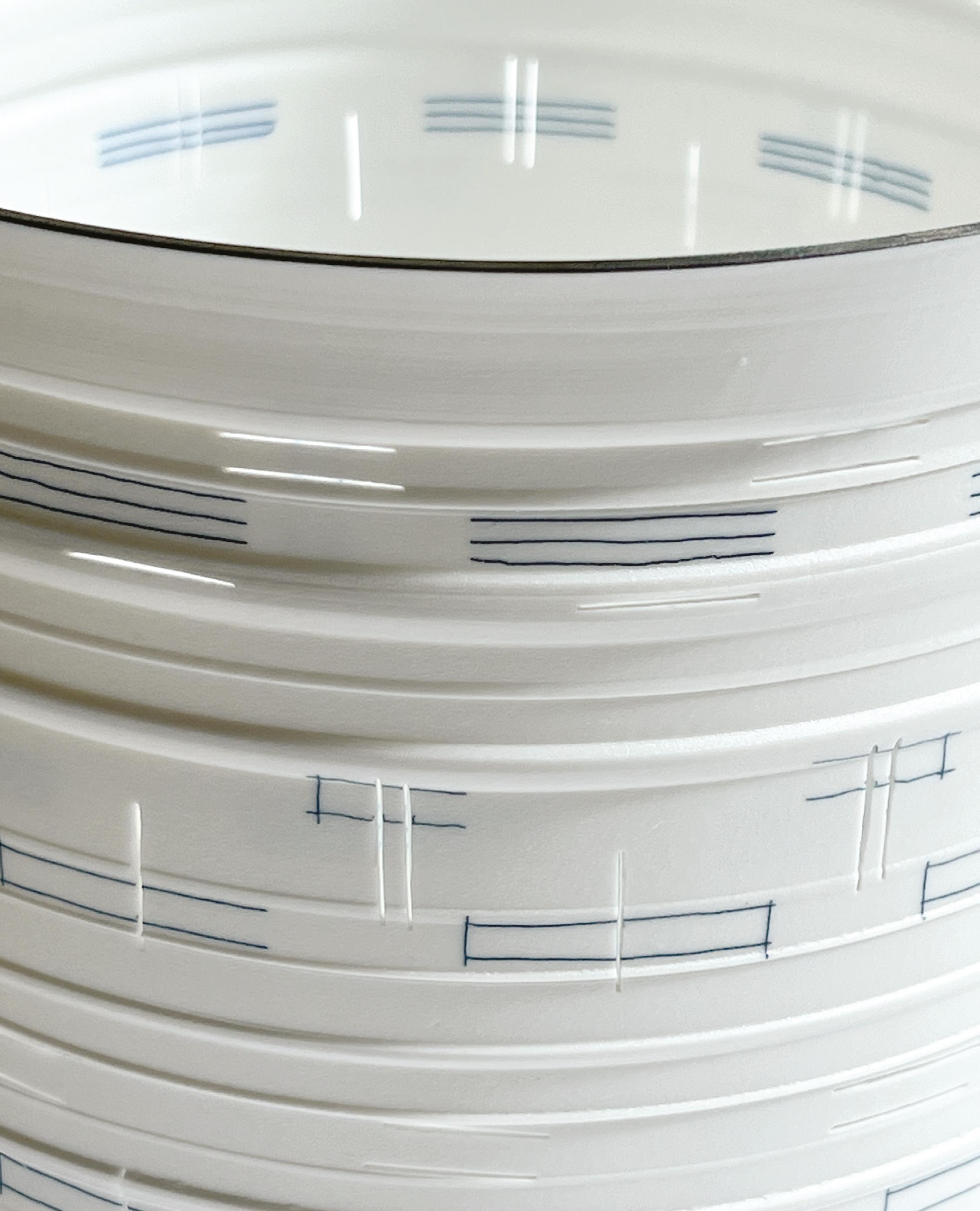
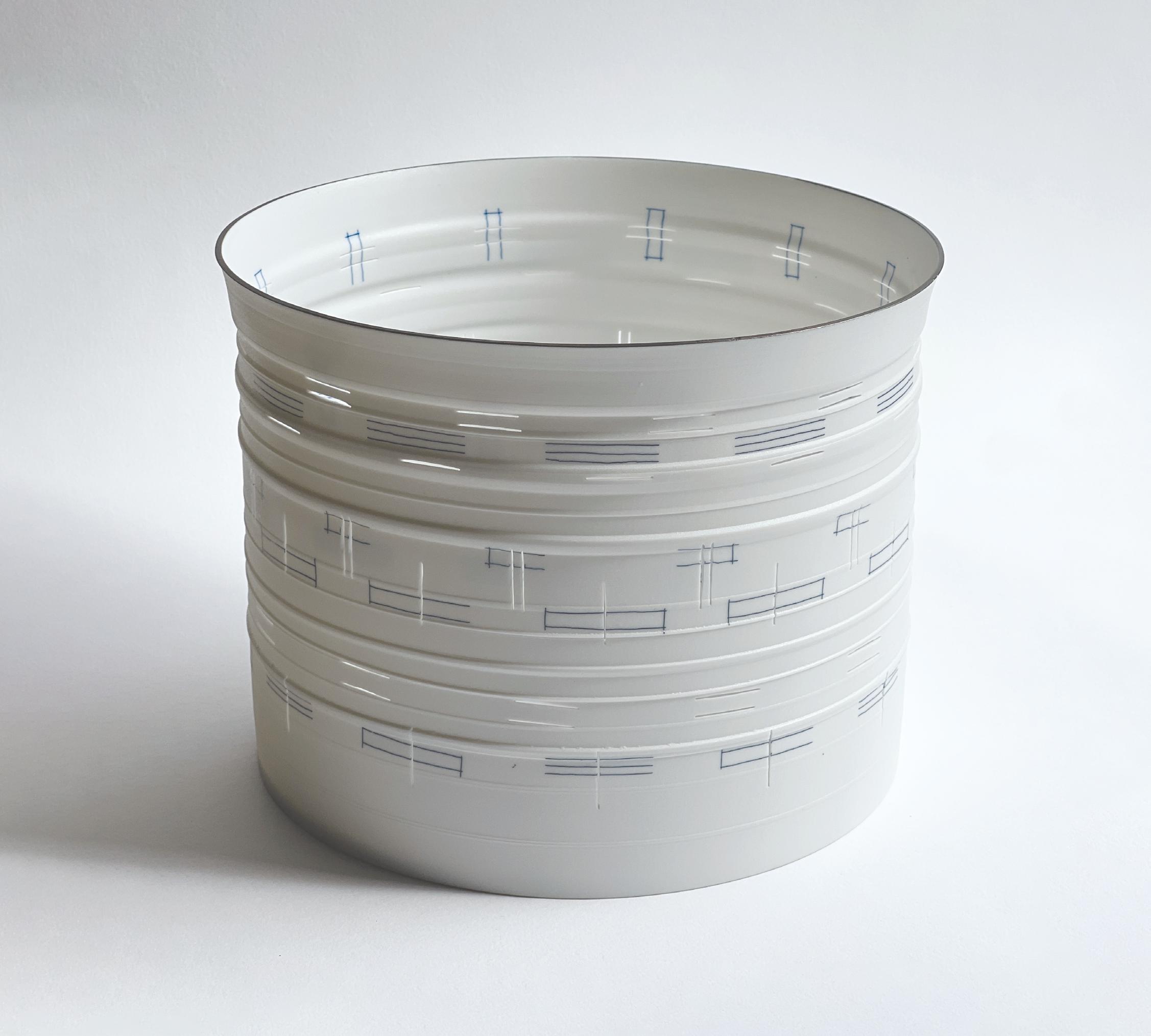 3/ Rain, 2022
porcelain cylinder no 5a
H18 x D23 cm
3/ Rain, 2022
porcelain cylinder no 5a
H18 x D23 cm
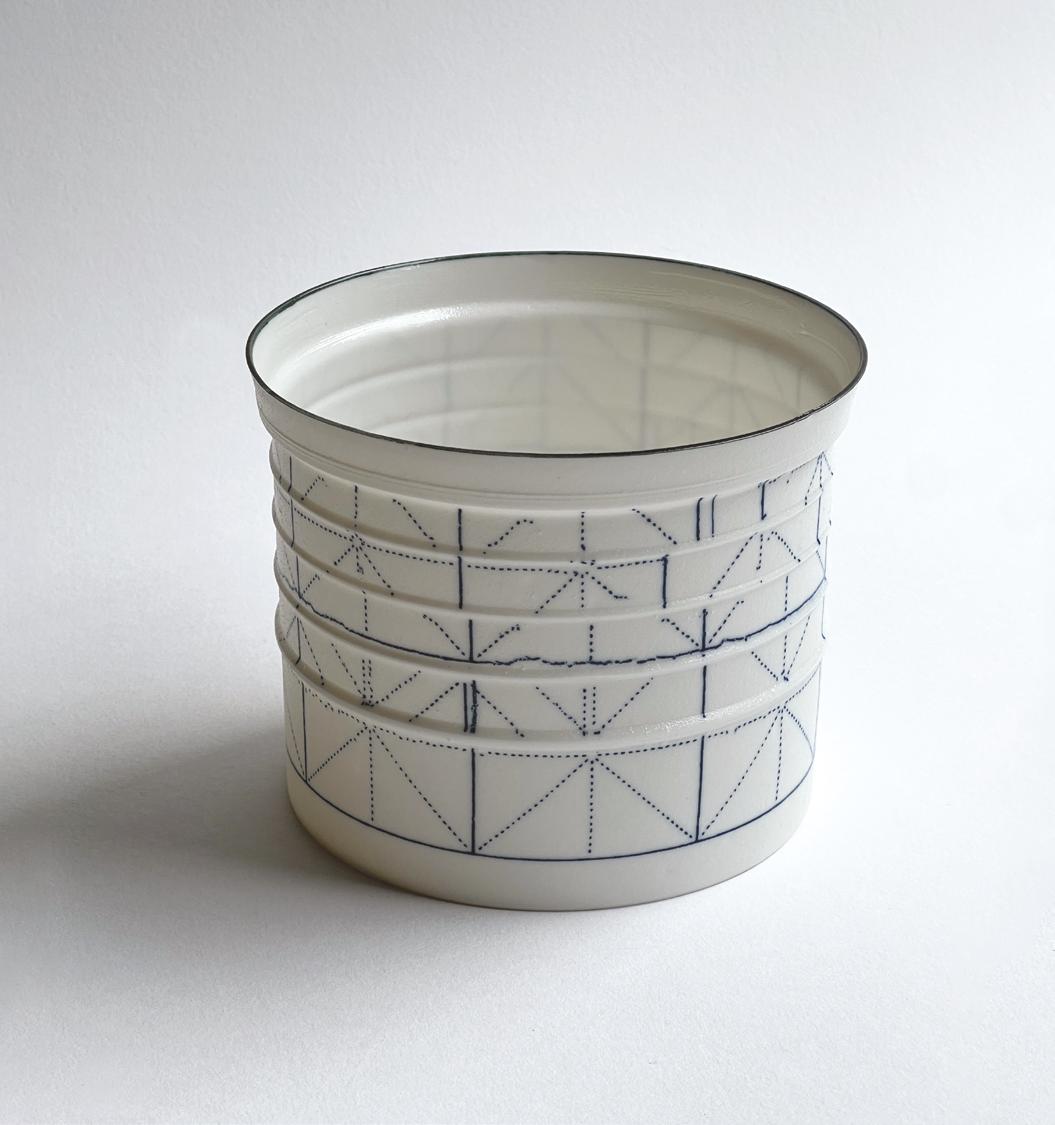
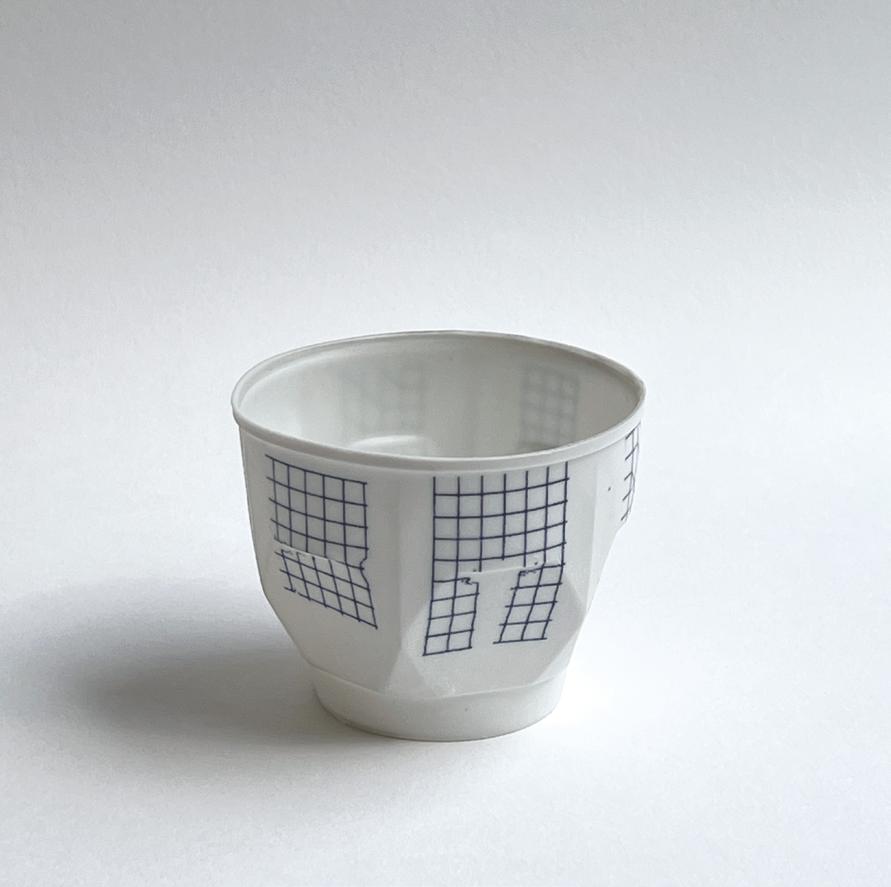
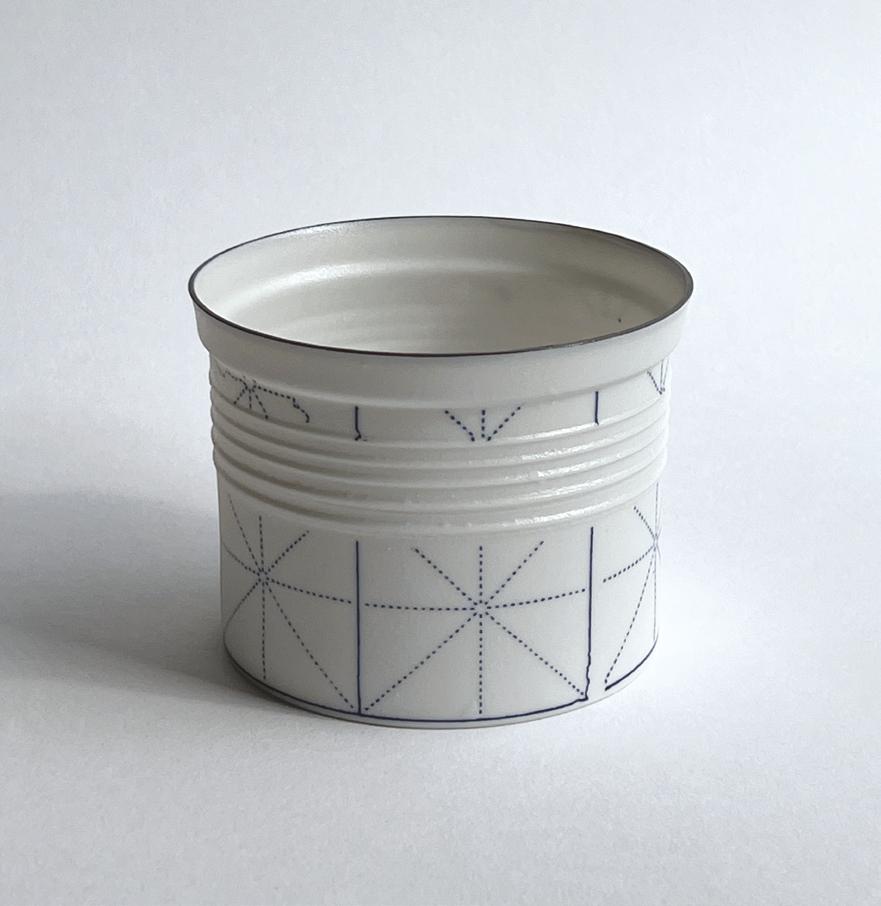
 5/ Little Form with Net, 2021 porcelain form H7 x D8.5 cm
4/ Korea II, 2023 porcelain cylinder no 1a H7.5 x D9.5 cm
7/ Korea I, 2023 porcelain cylinder no 2a H10 x D12.5 cm
6/ Korea IV, 2023 porcelain cylinder no 1 H8 x D9 cm
5/ Little Form with Net, 2021 porcelain form H7 x D8.5 cm
4/ Korea II, 2023 porcelain cylinder no 1a H7.5 x D9.5 cm
7/ Korea I, 2023 porcelain cylinder no 2a H10 x D12.5 cm
6/ Korea IV, 2023 porcelain cylinder no 1 H8 x D9 cm
8/ Blue Cuts, 2023
porcelain cylinder no 2a
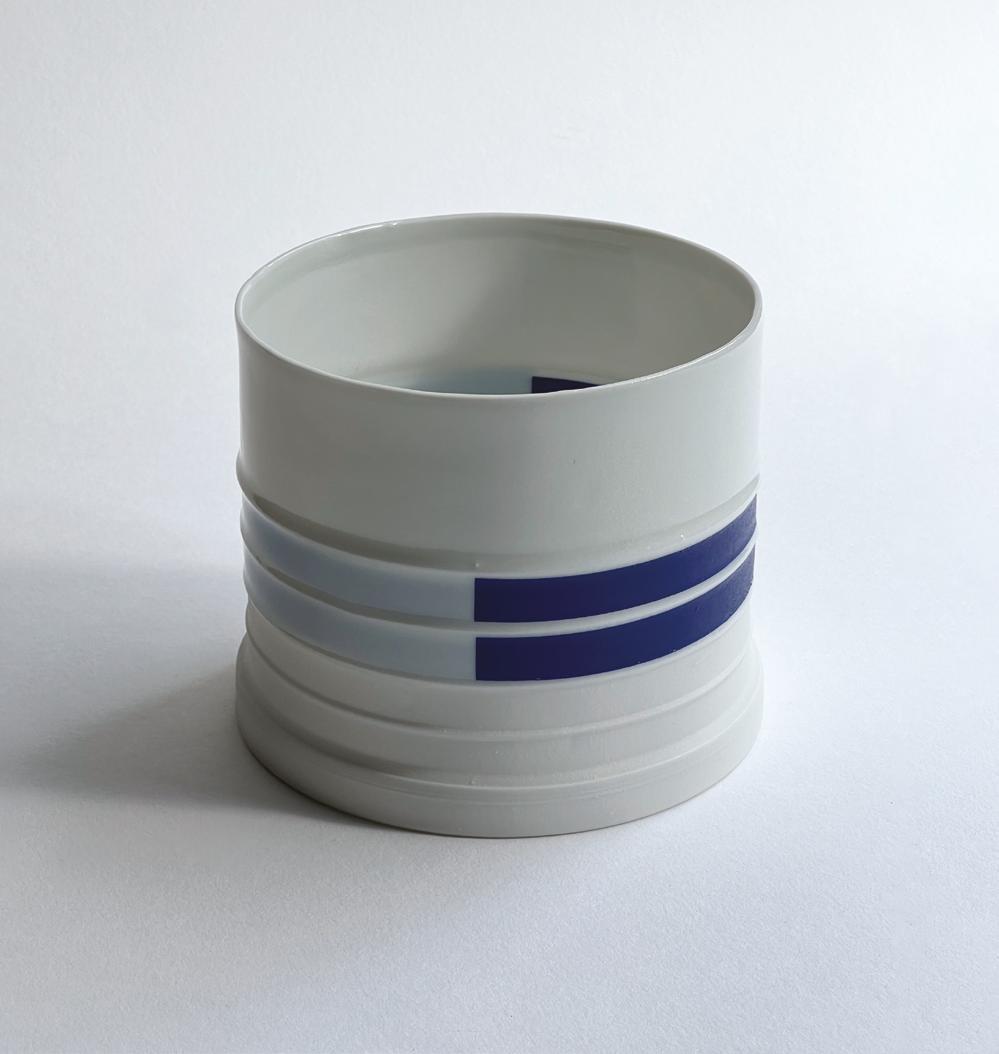
H10 x D12.5 cm


 9/ Blue Lines, 2021 porcelain cylinder no 5a H18 x D24 cm
9/ Blue Lines, 2021 porcelain cylinder no 5a H18 x D24 cm
10/ Blue Stripes, 2021
porcelain twelve-sided form
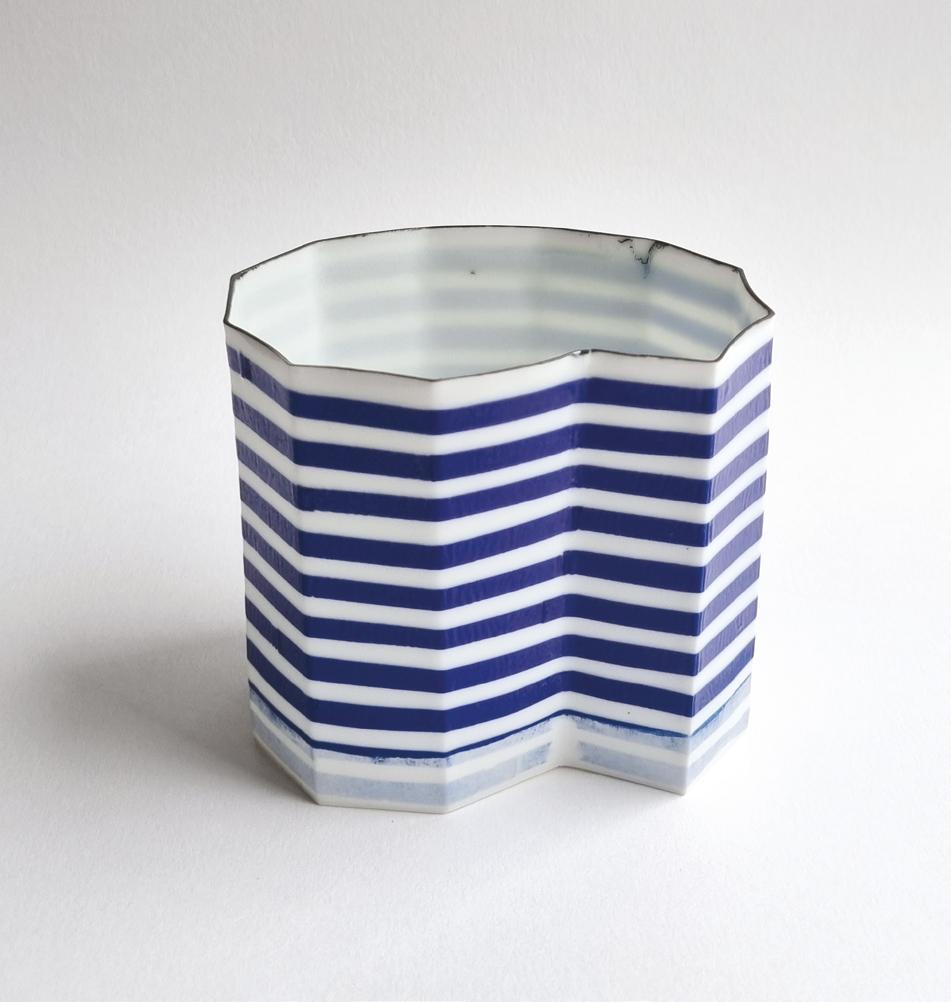
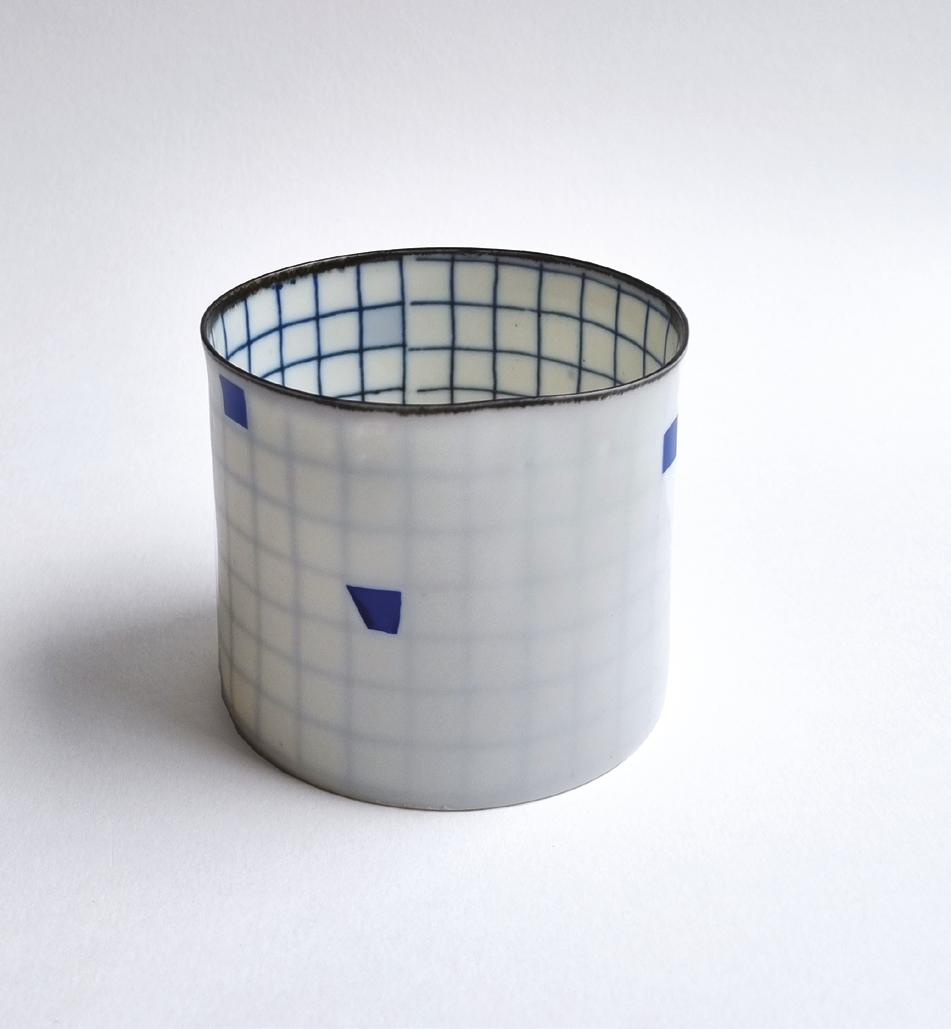
H9.5 x W11 x D9 cm
11/ Square, 2022
porcelain cylinder no 1
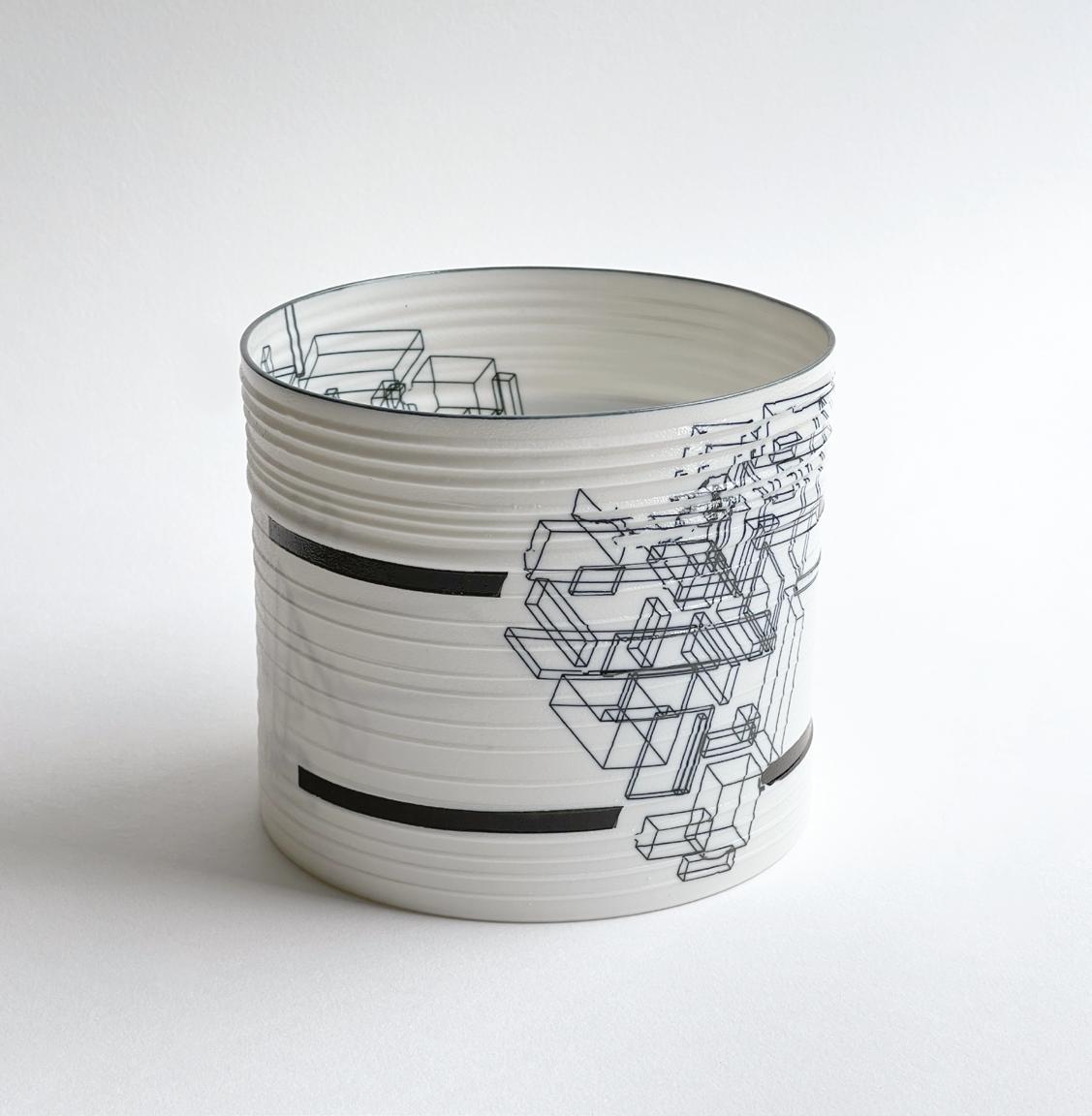
H7.5 x D9 cm
12/ City II, 2023
porcelain cylinder no 3a
H11 x D13 cm
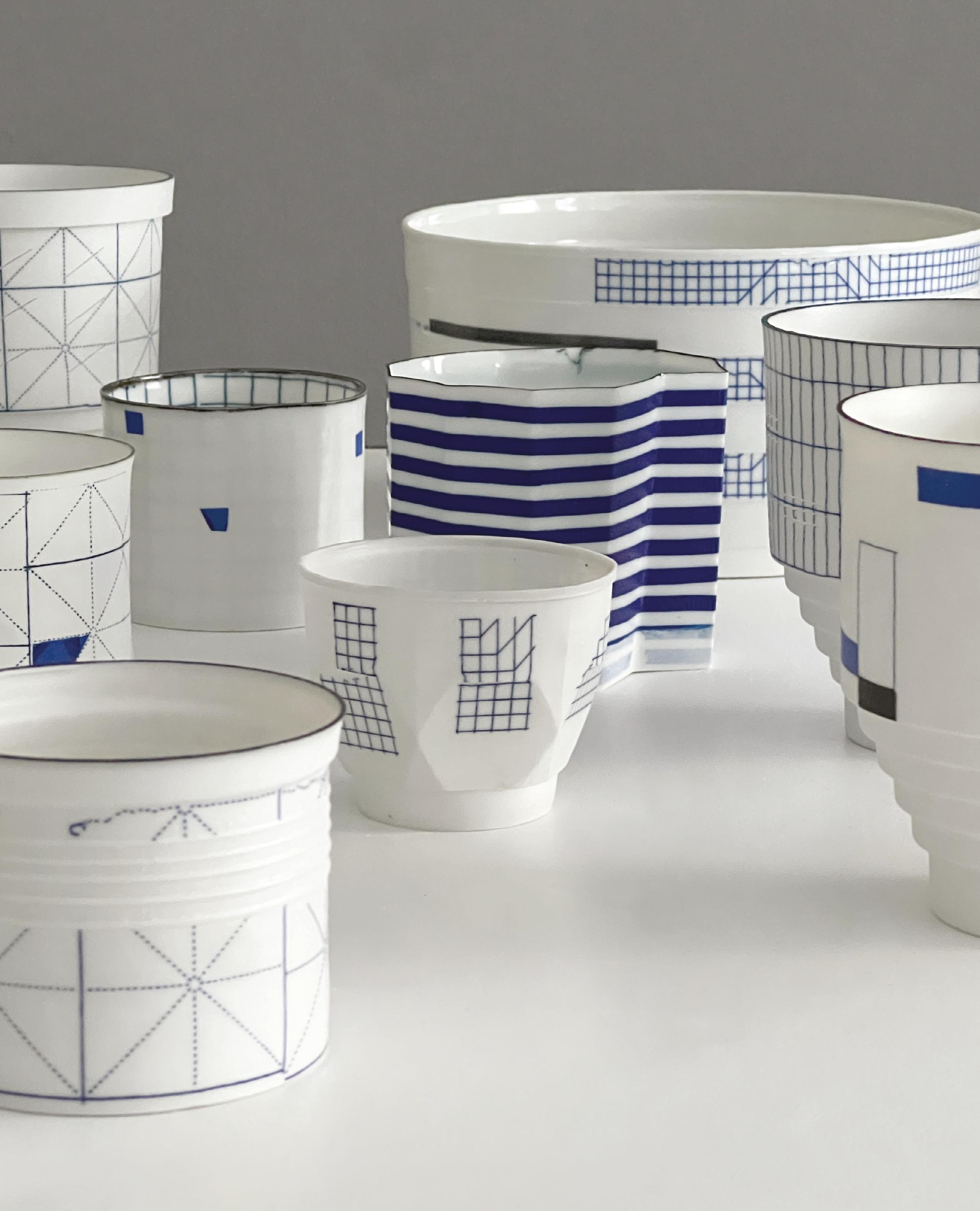
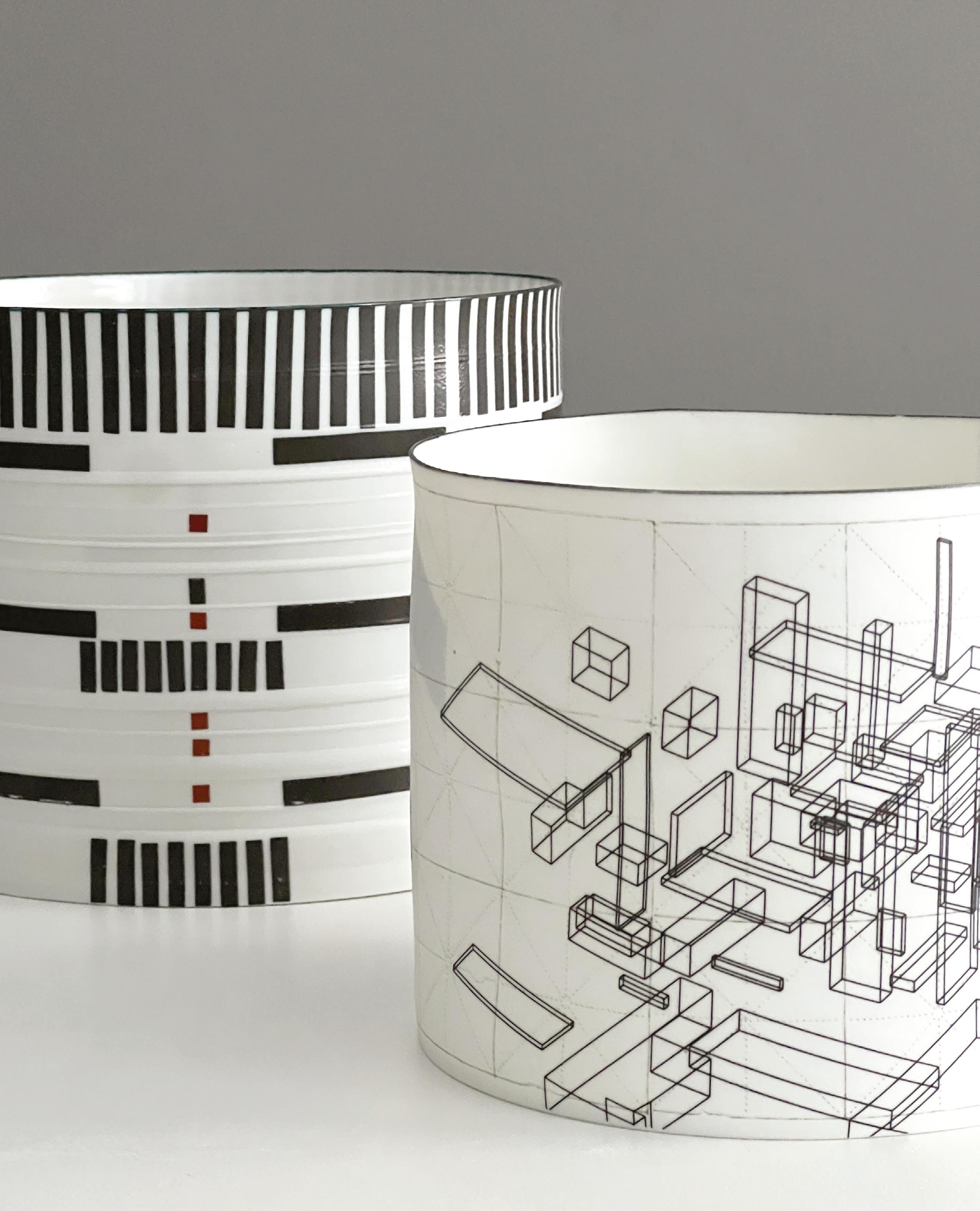
13/ Piano III, 2023
porcelain cylinder no 5a
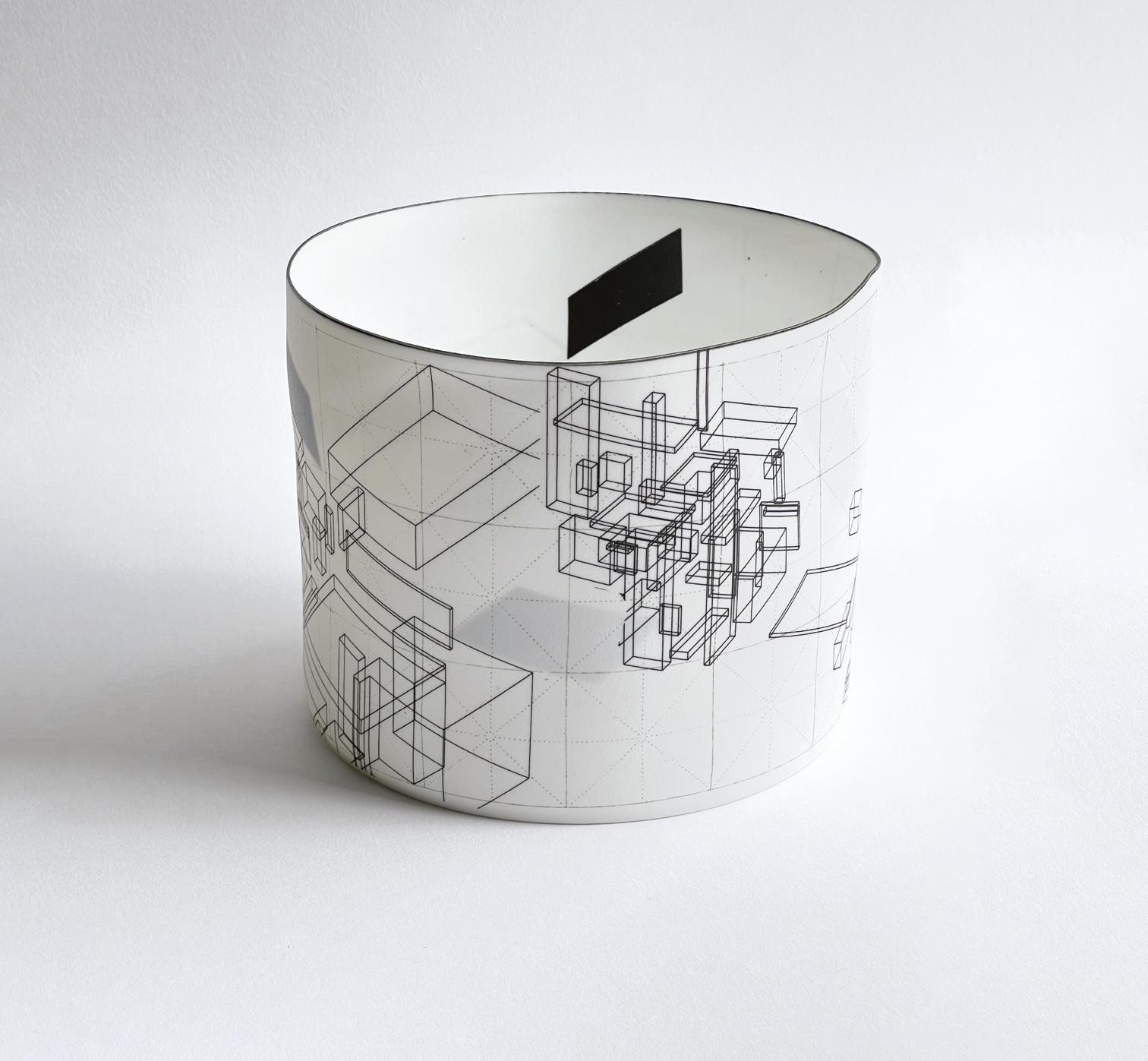
H18 x D22.5 cm
14/ City I, 2023
porcelain cylinder no 4
H15 x D19 cm
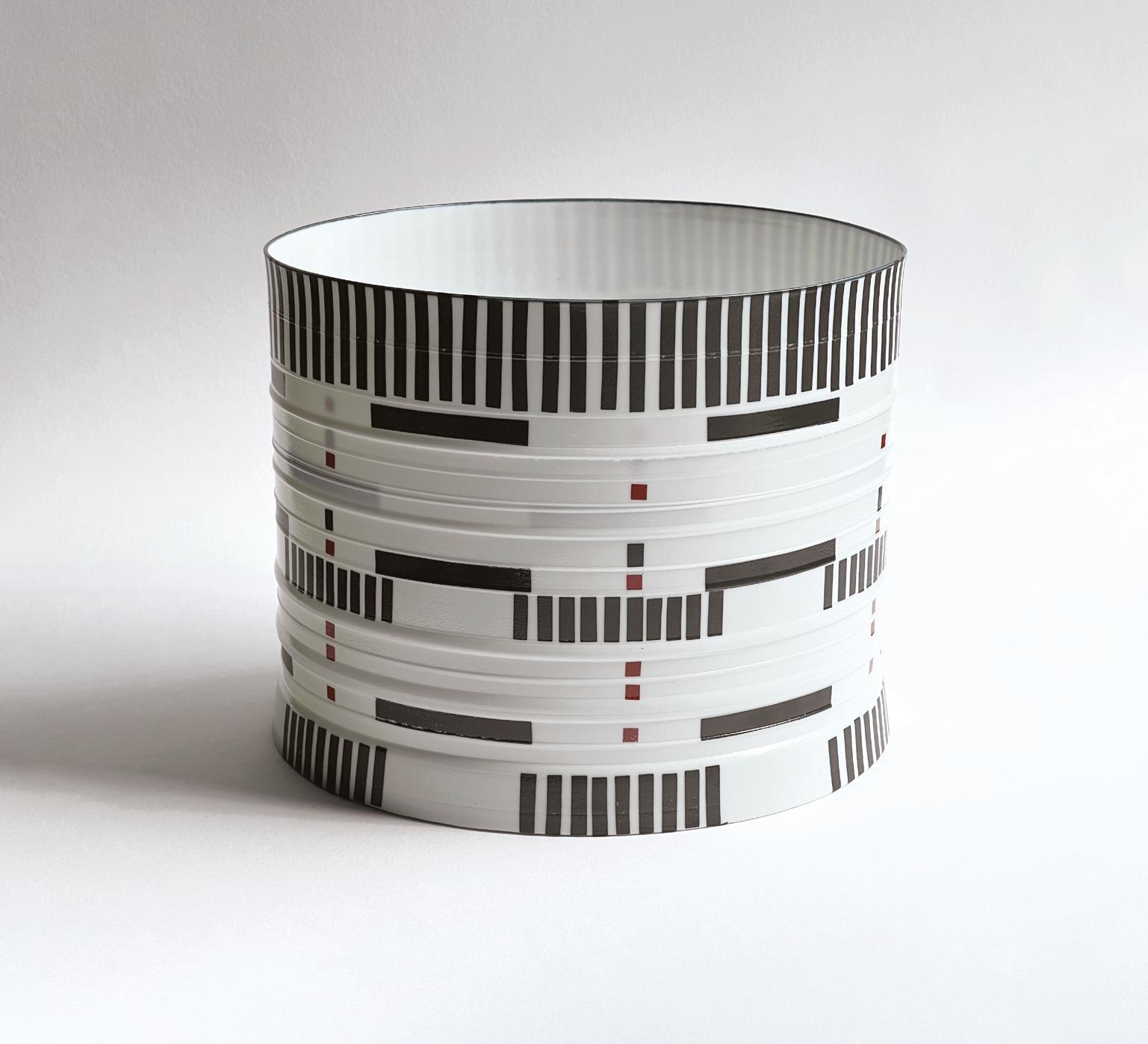
15/ Frosty Weather I, 2018 porcelain trapped form
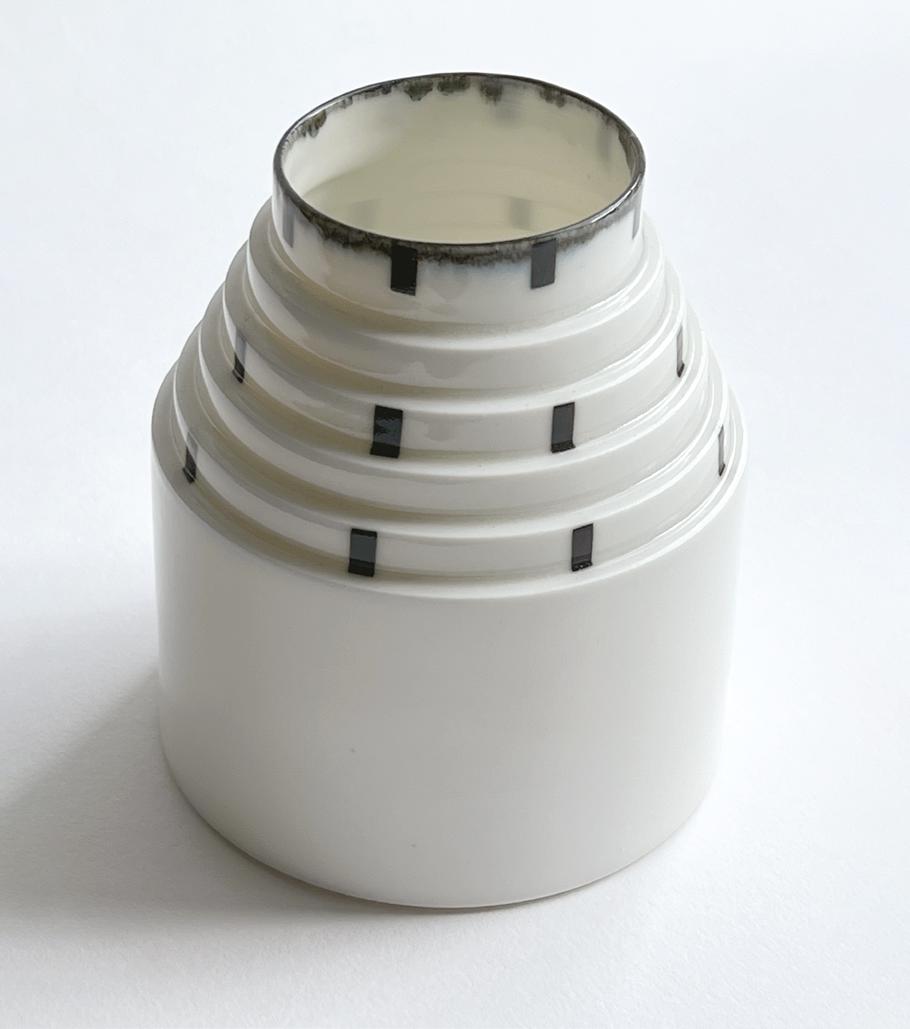

H13 x D11 cm
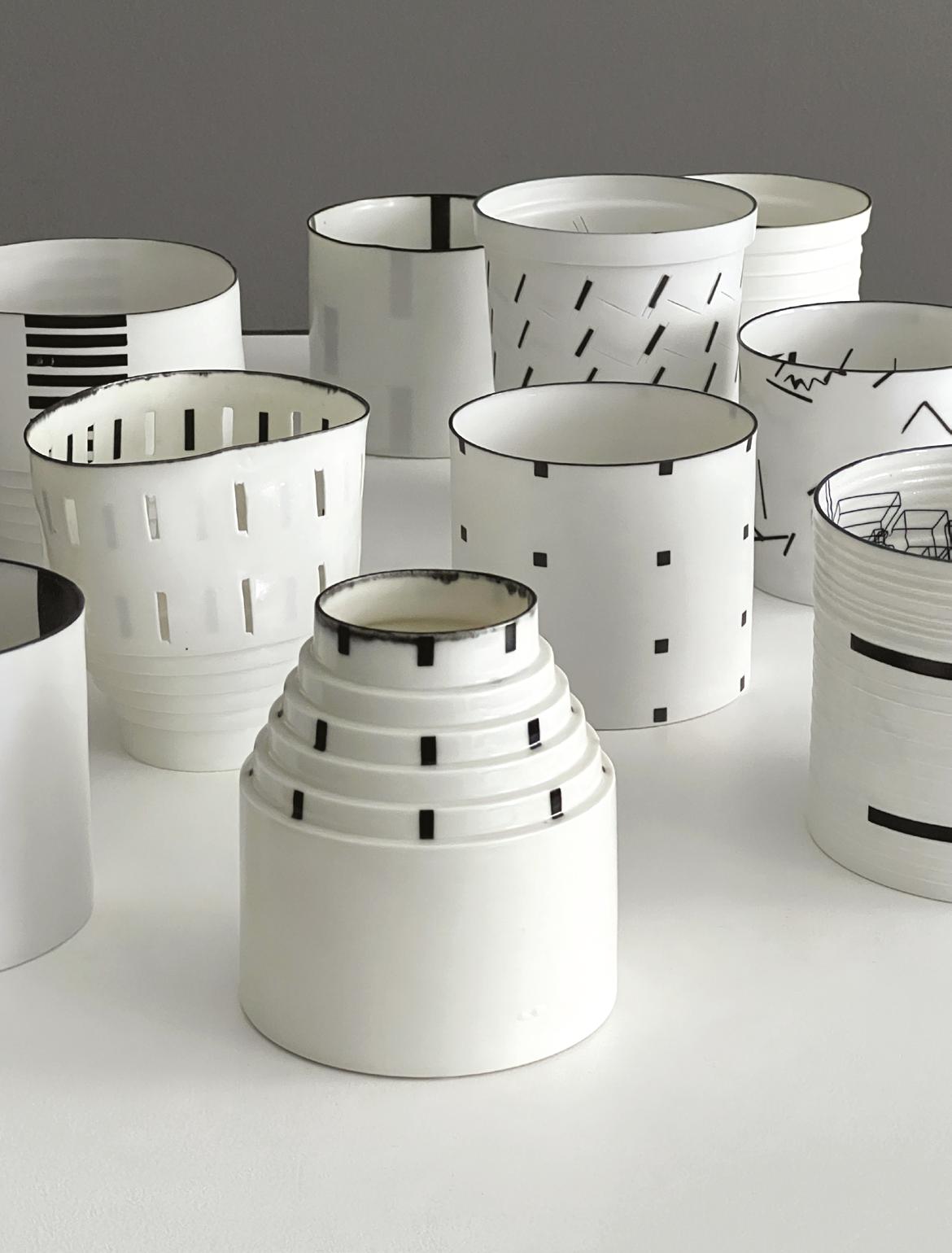
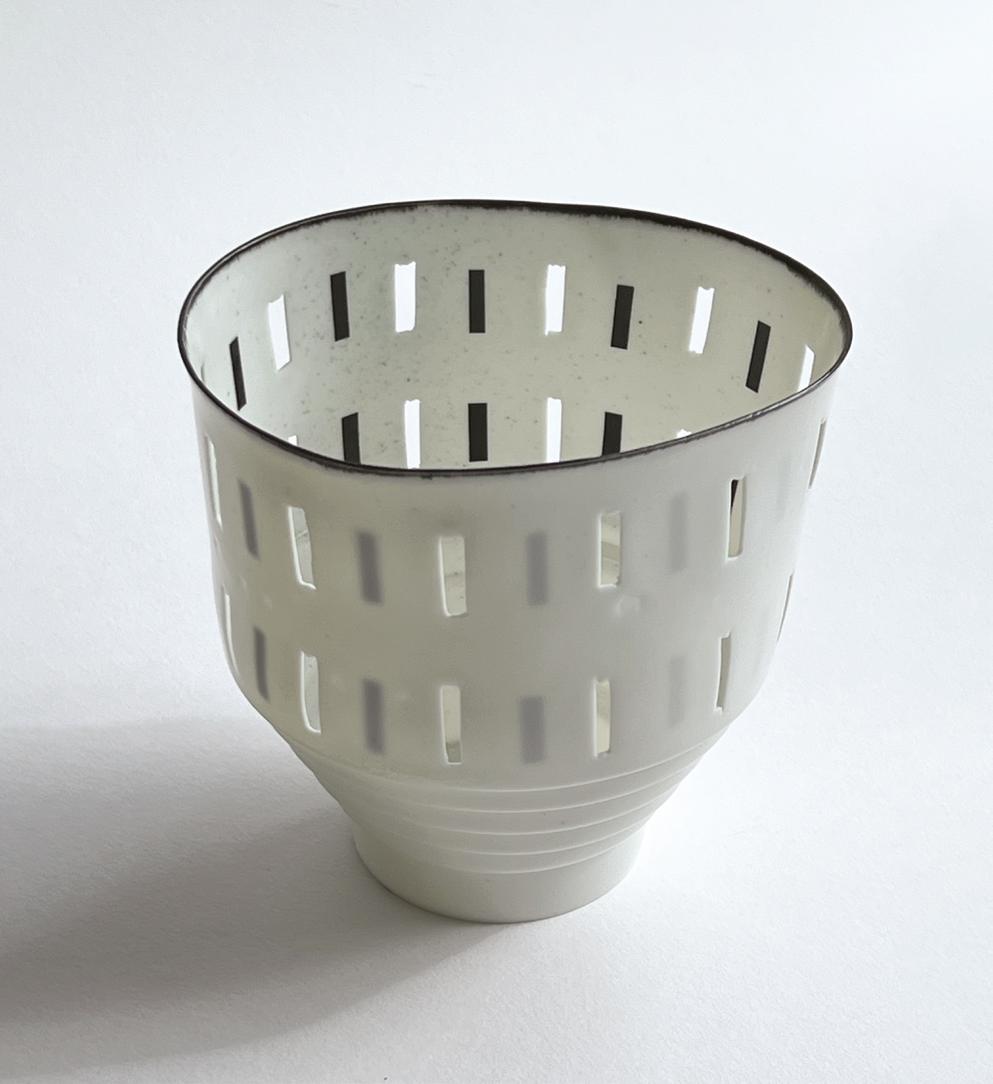
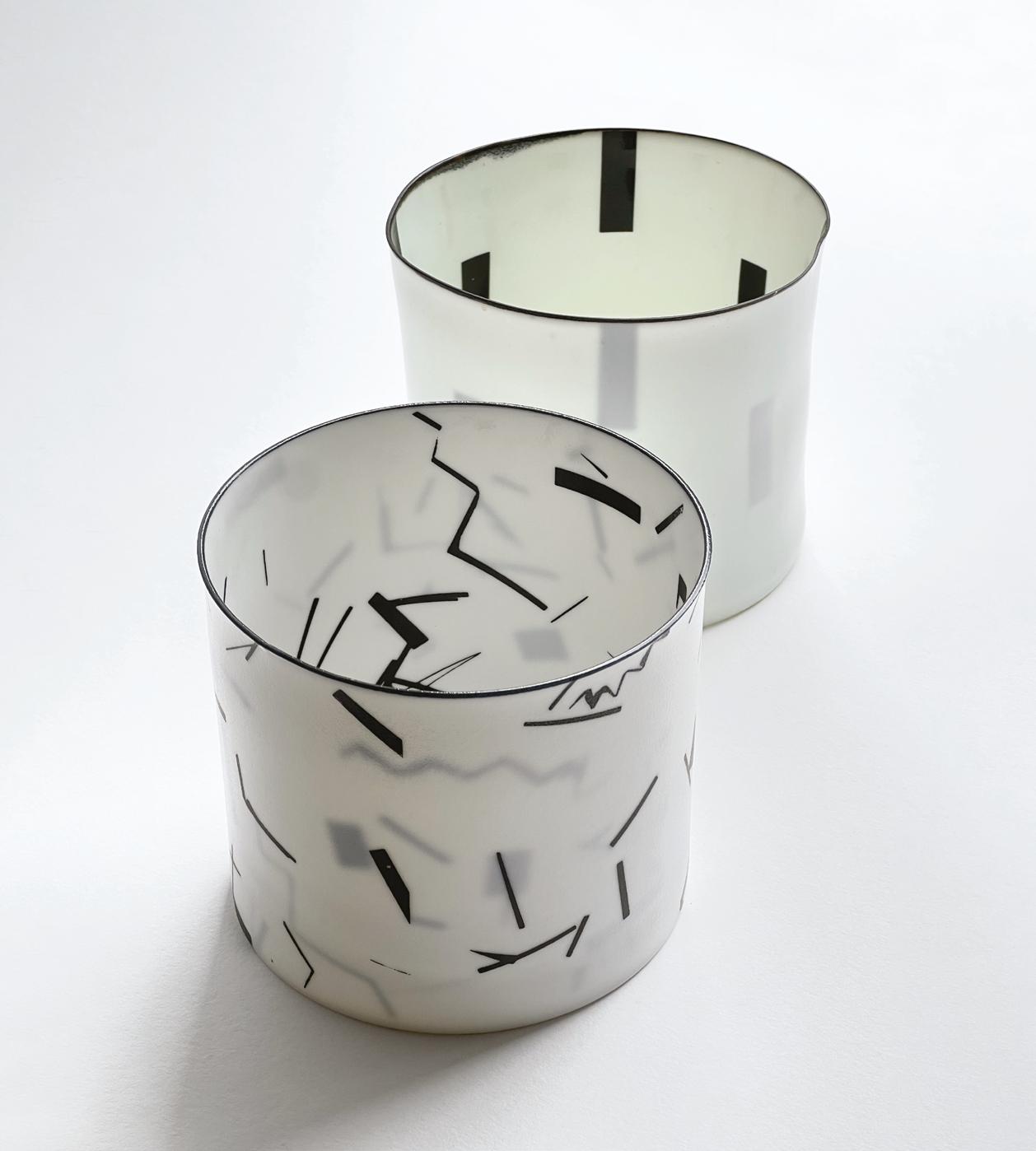 18/ Ice, 2018 porcelain trapped form H12 x W12 x D10 cm
17/ Cuts, 2023 porcelain cylinder no 2 H10 x D11.5 cm
16/ Black and White II, 2023 porcelain cylinder no 2 H10 x D12 cm
18/ Ice, 2018 porcelain trapped form H12 x W12 x D10 cm
17/ Cuts, 2023 porcelain cylinder no 2 H10 x D11.5 cm
16/ Black and White II, 2023 porcelain cylinder no 2 H10 x D12 cm
clockwise from top left:
19/ Summer, 2022
porcelain cylinder no 2 H10 x D12 cm
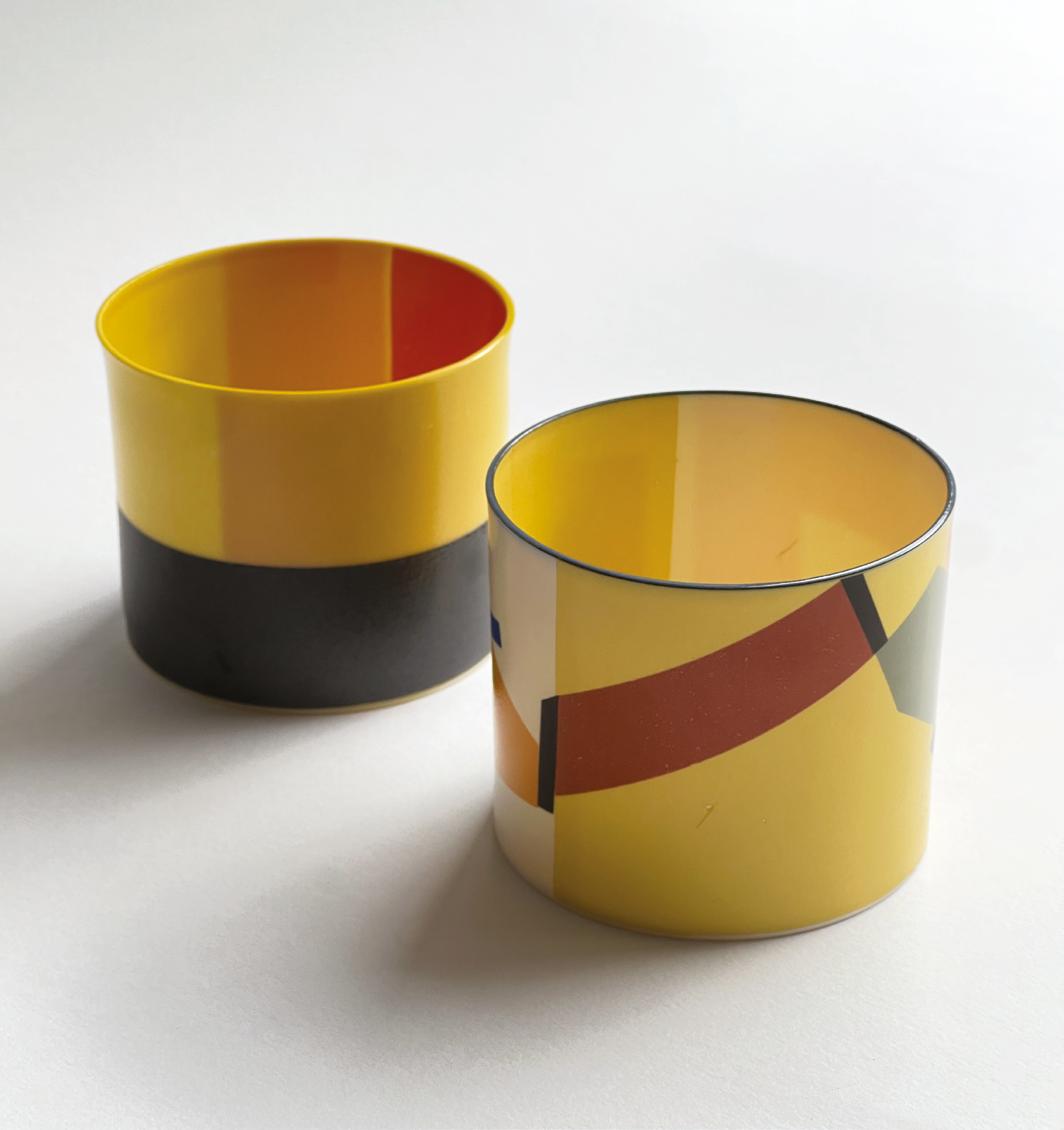
20/ Colour I, 2023
porcelain cylinder no 1 H8 x D9 cm
21/ Colour III, 2023
porcelain cylinder no 1 H8 x D9 cm
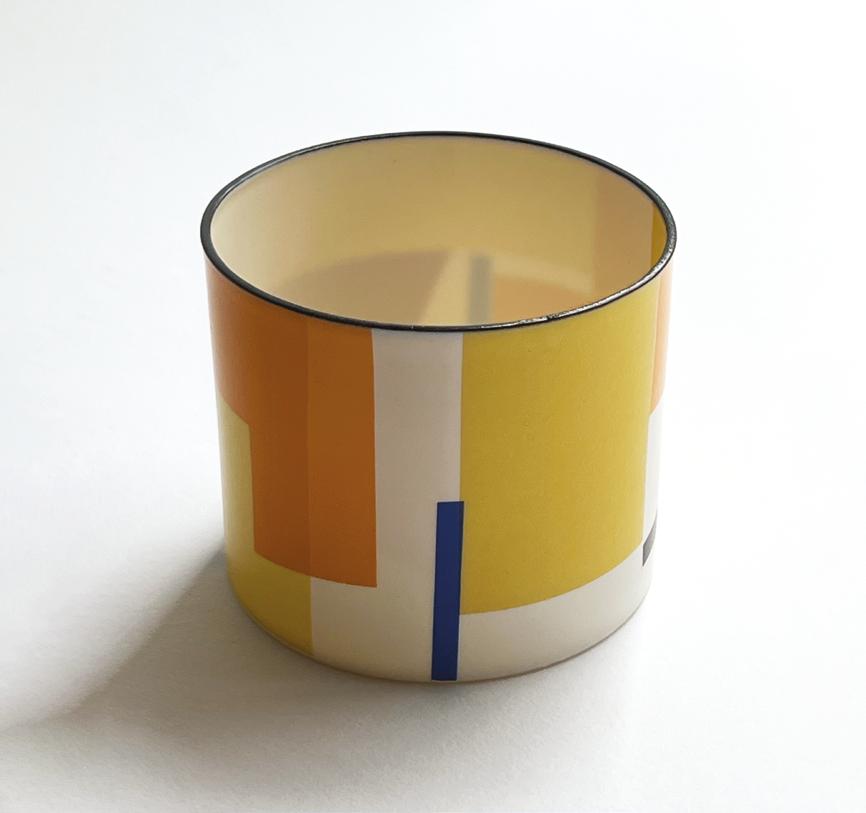
22/ Colour II, 2023
porcelain cylinder no 1
H8 x D9 cm

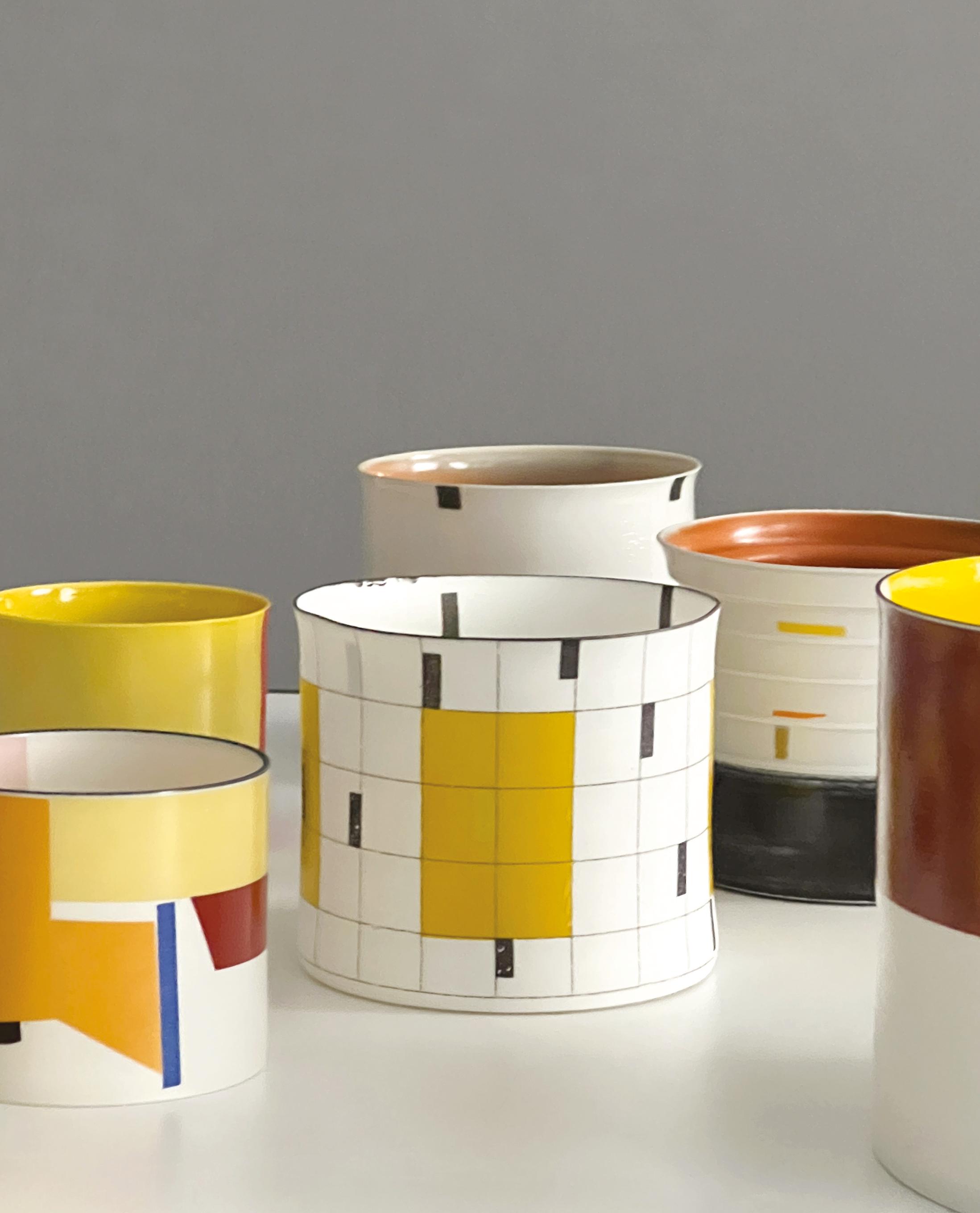
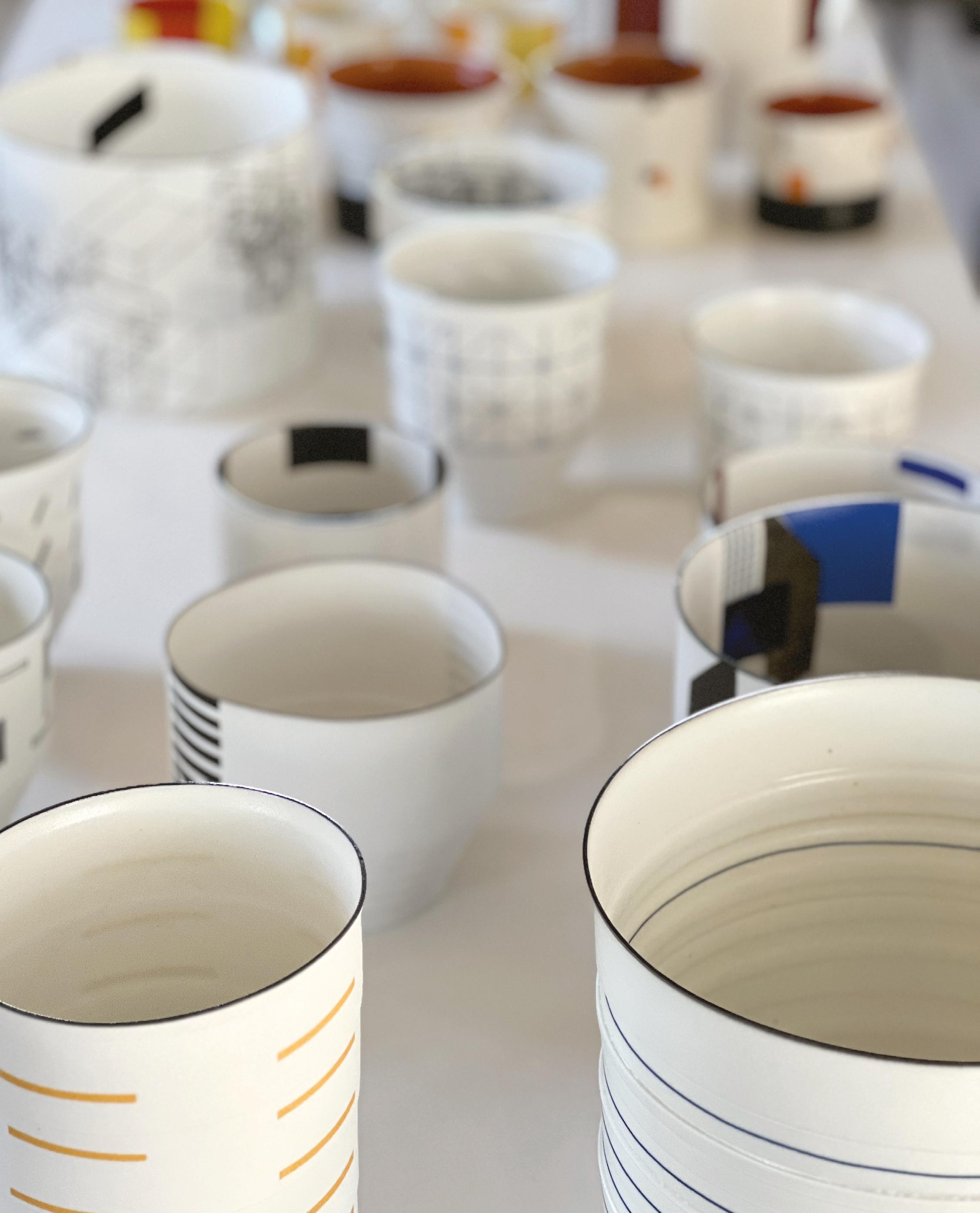

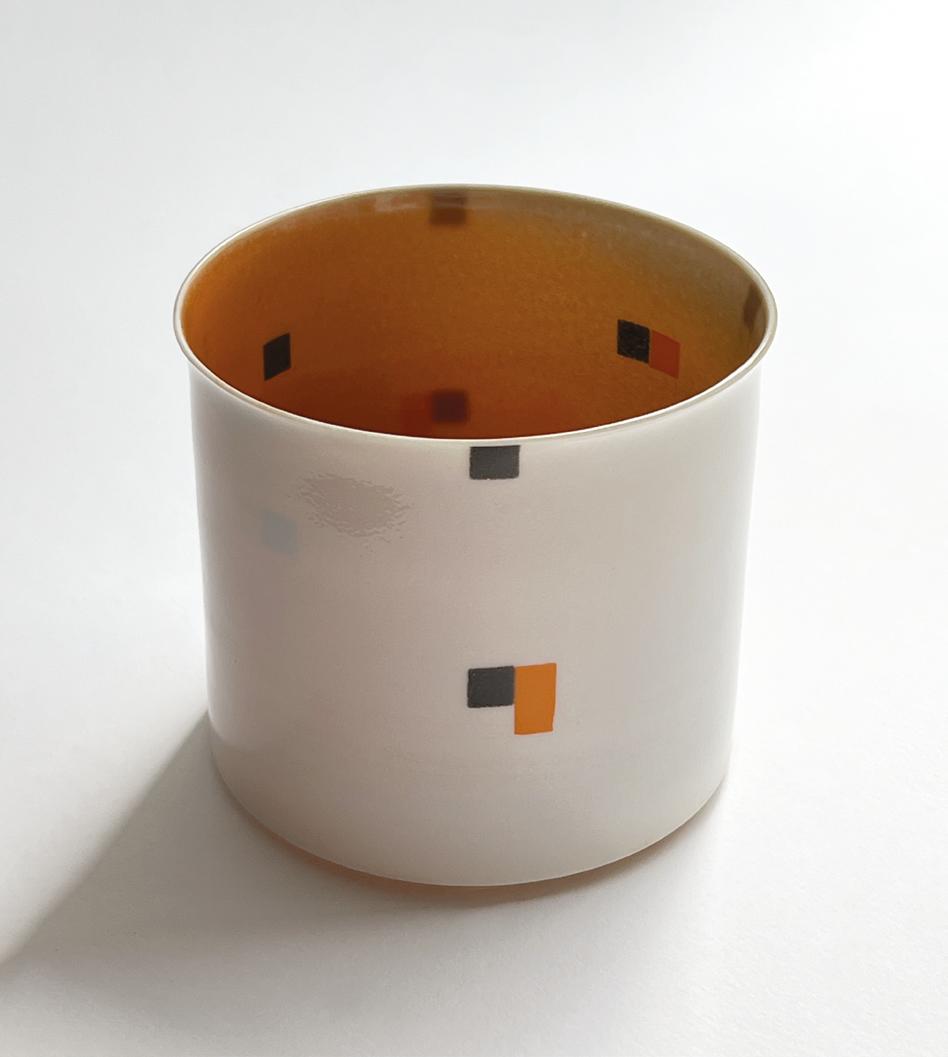
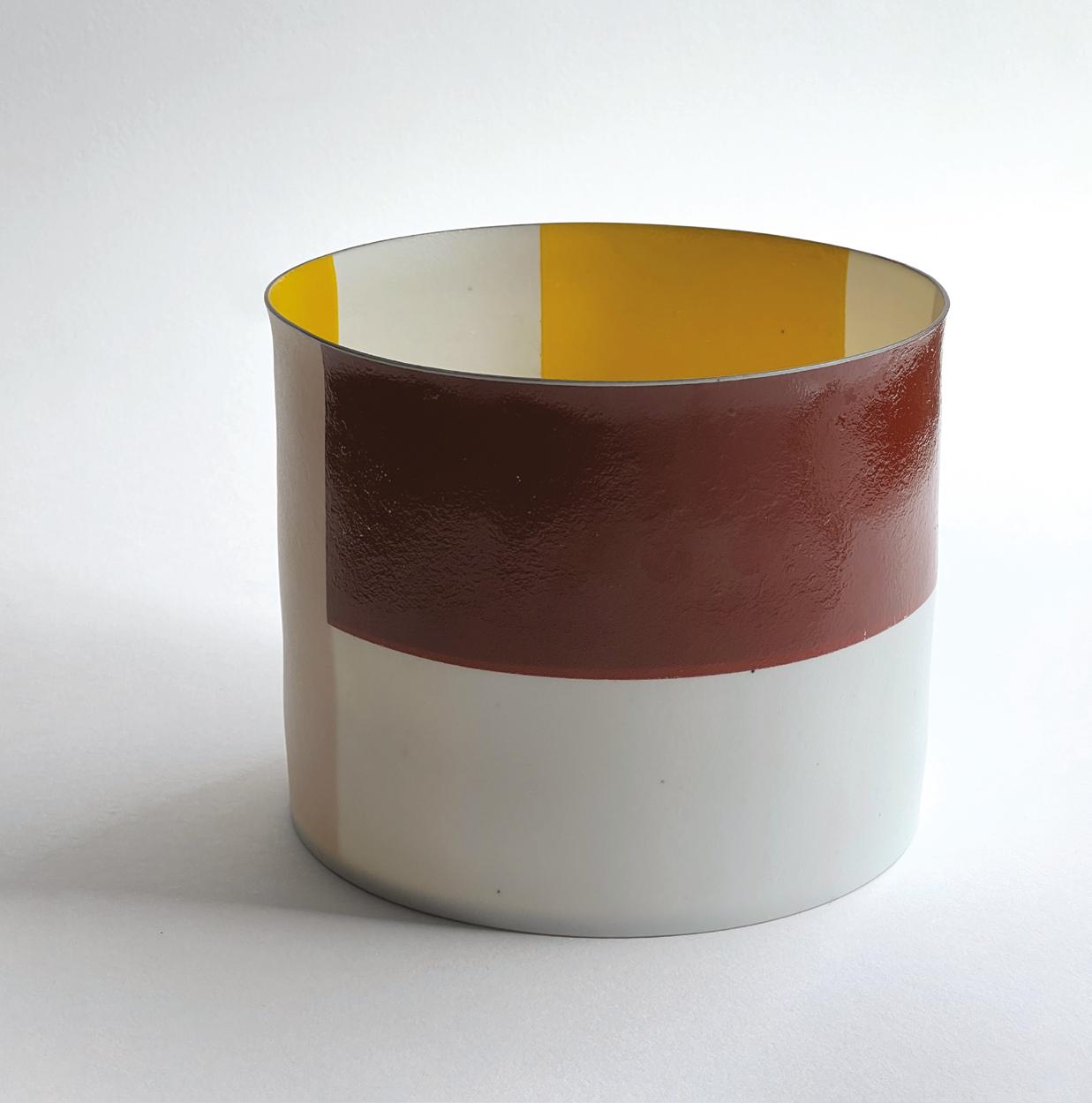 25/ Autumn, 2022 porcelain cylinder no 4a H13 x D16 cm
24/ Orange and White, 2023 porcelain cylinder no 2 H10 x D11.5 cm
23/ Orange, 2018 porcelain cylinder no 3 with rim H12.5 x D13.5 cm
25/ Autumn, 2022 porcelain cylinder no 4a H13 x D16 cm
24/ Orange and White, 2023 porcelain cylinder no 2 H10 x D11.5 cm
23/ Orange, 2018 porcelain cylinder no 3 with rim H12.5 x D13.5 cm
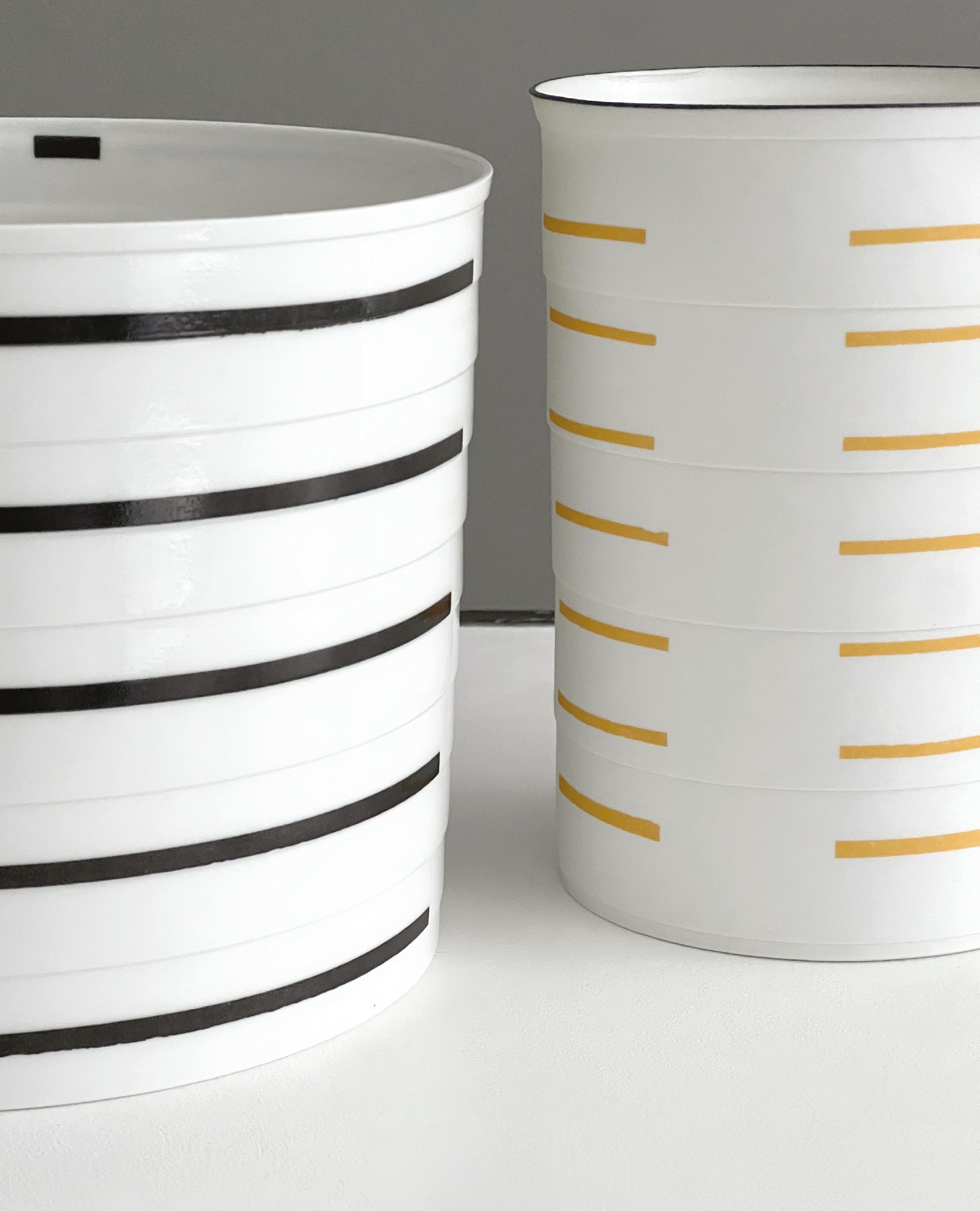 26/ Yellow, 2022 (detail) porcelain cylinder no 3a H18.5 x D14 cm
26/ Yellow, 2022 (detail) porcelain cylinder no 3a H18.5 x D14 cm
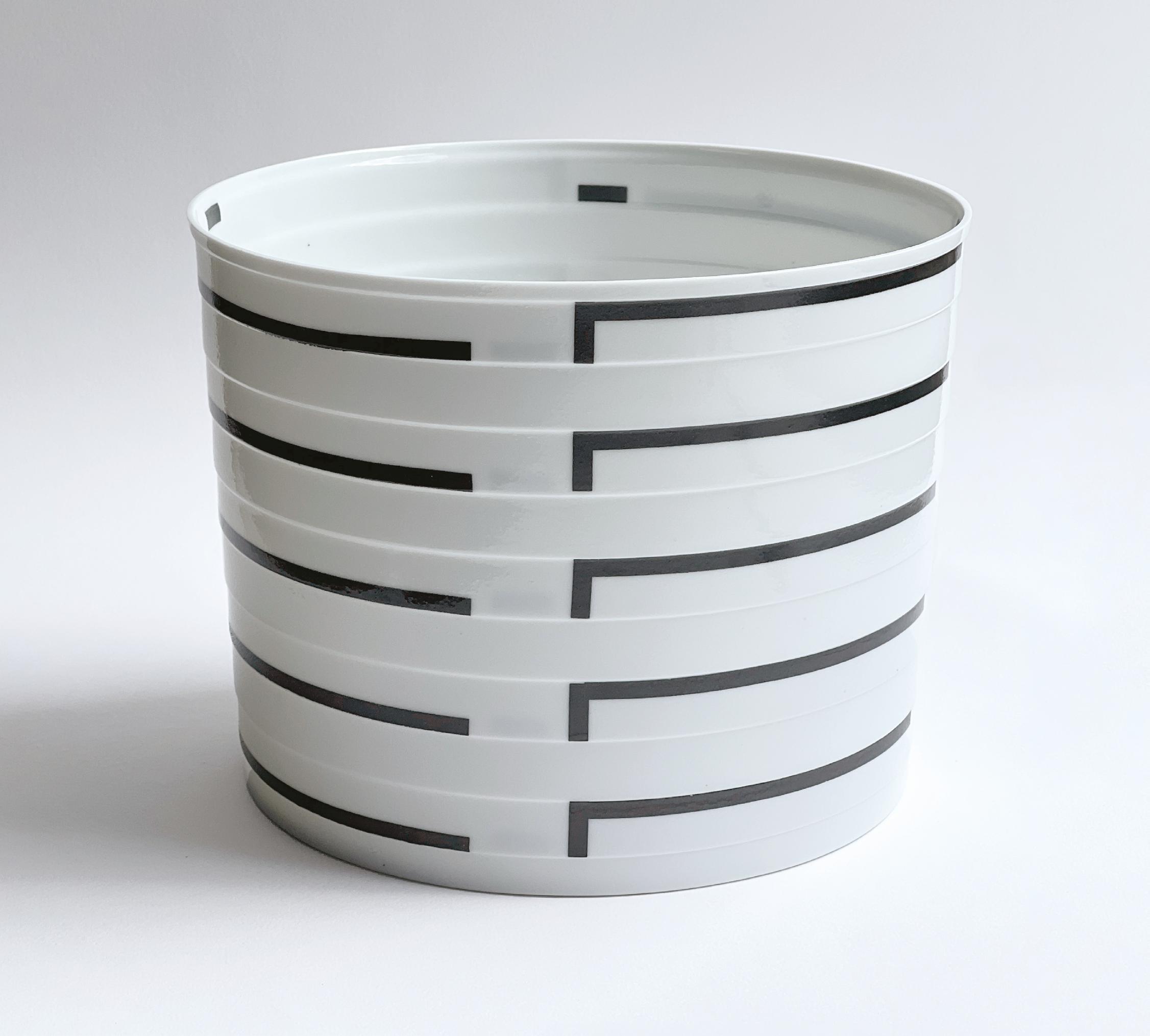 27/ Black, 2021 porcelain cylinder no 5
H18 x D22 cm
27/ Black, 2021 porcelain cylinder no 5
H18 x D22 cm
28/ Black and White III, 2023
porcelain cylinder no 2
H10 x D11 cm
29/ Black and White, 2023
porcelain cylinder no 2

H10 x D11 cm
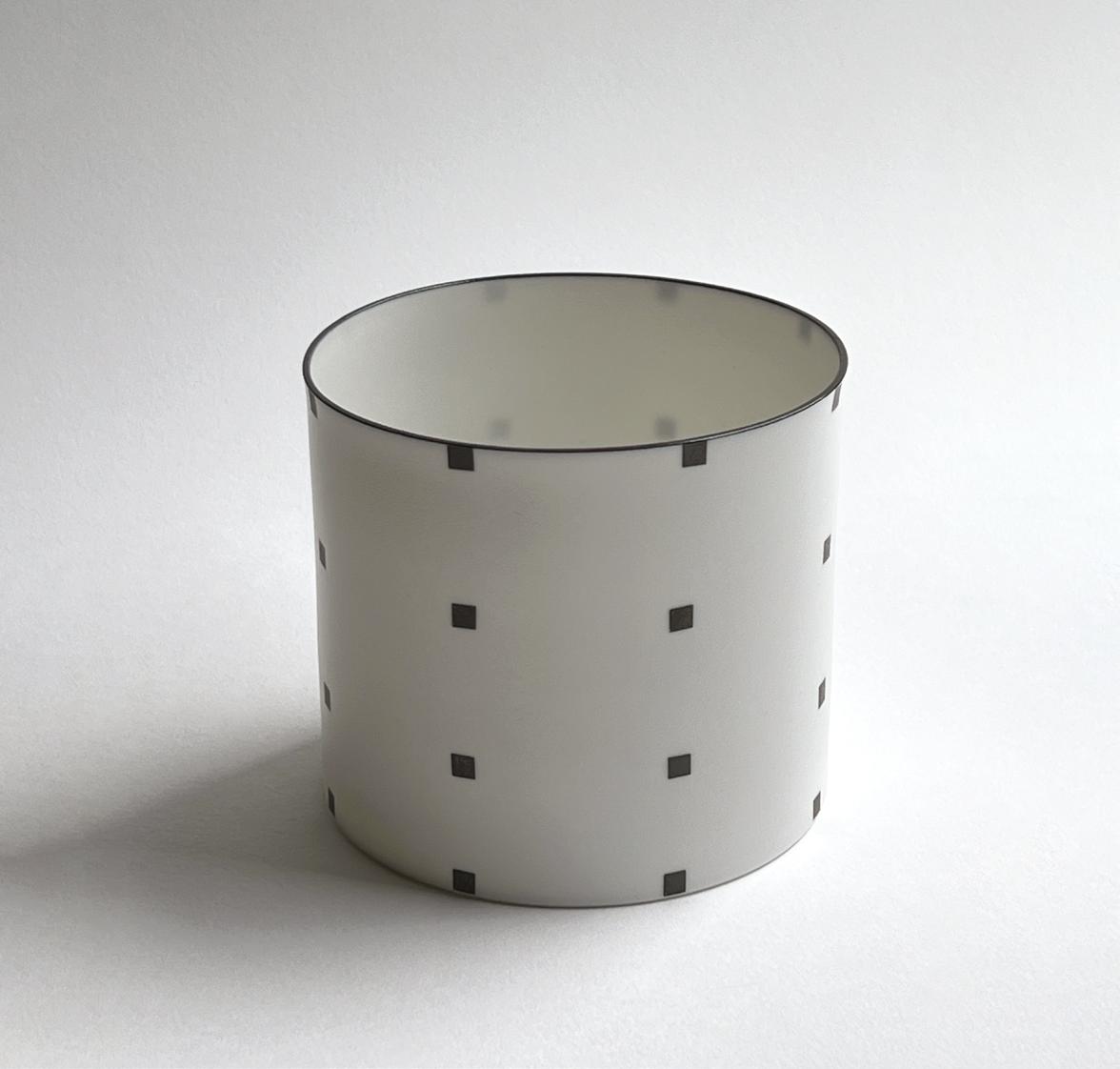

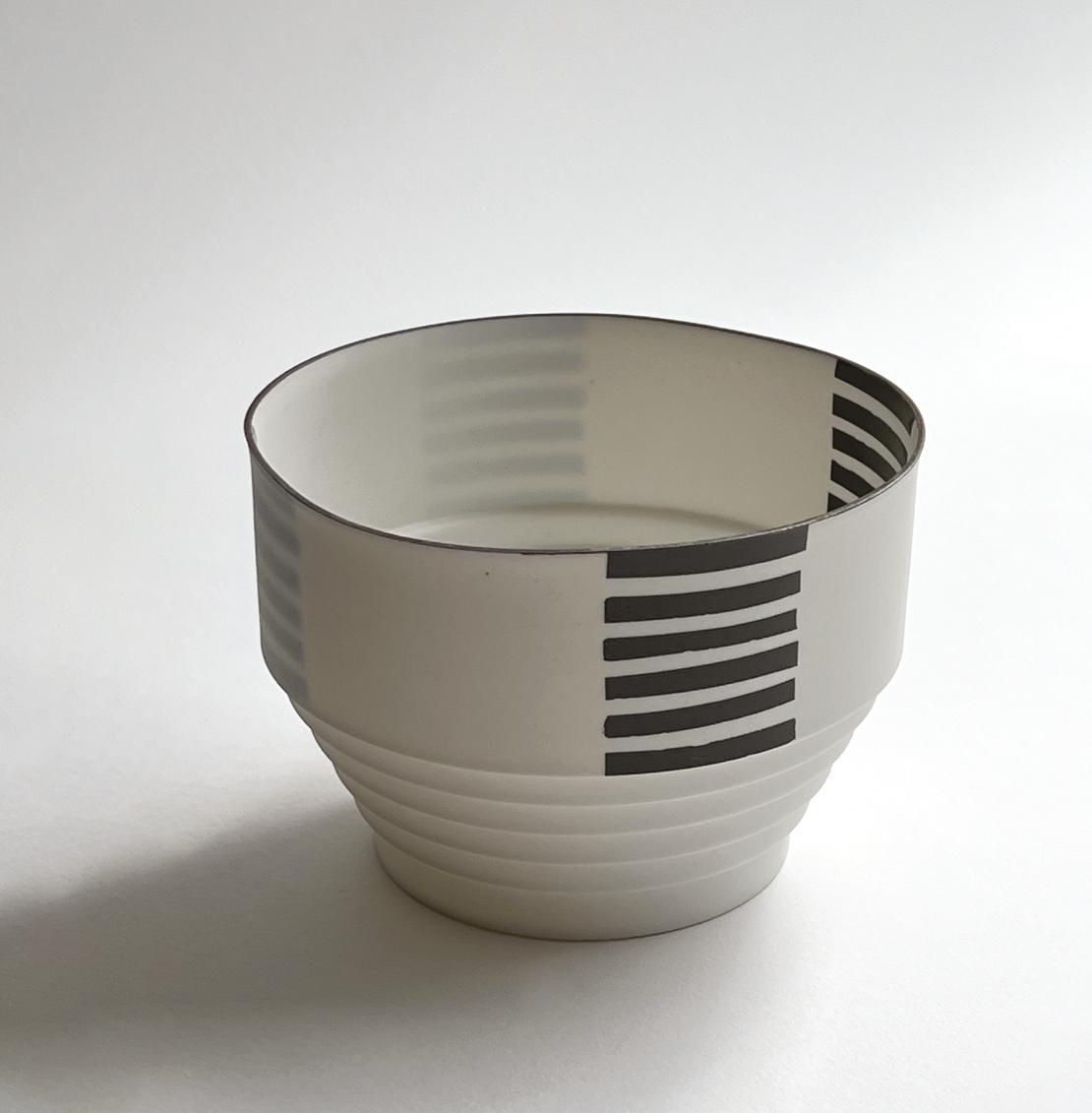
 32/ Piano II, 2023
porcelain Arabian form H10 x D14 cm
31/ Blue, 2023
porcelain Arabian form H12 x D11 cm
30/ Composition with Red and Blue, 2023 porcelain Arabian form H10 x D14 cm
32/ Piano II, 2023
porcelain Arabian form H10 x D14 cm
31/ Blue, 2023
porcelain Arabian form H12 x D11 cm
30/ Composition with Red and Blue, 2023 porcelain Arabian form H10 x D14 cm
porcelain Arabian form
H12
porcelain Arabian form
H14 x D12 cm
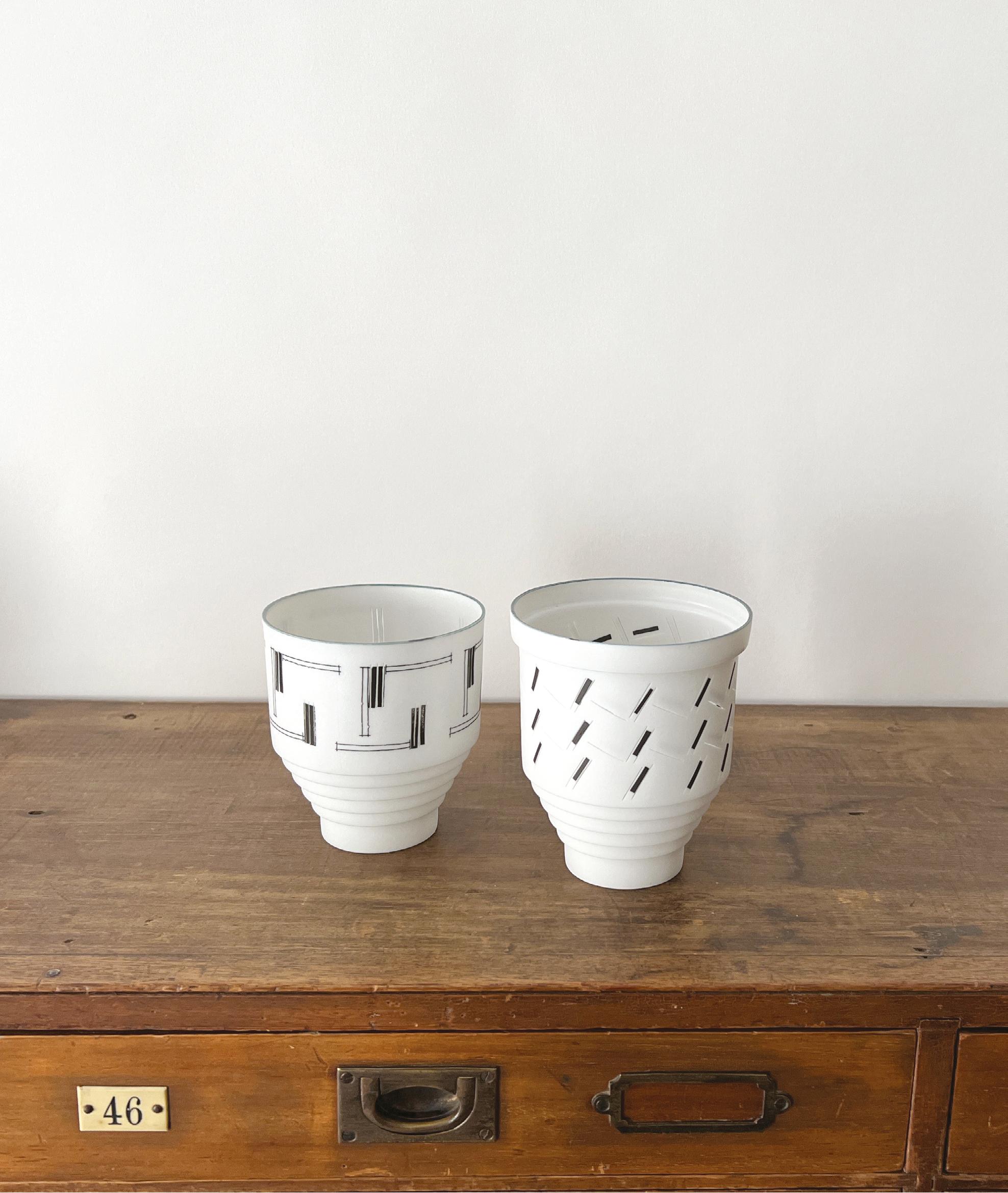 33/ Raindrop, 2022
x D11 cm
34/ Winter, 2022
with ring
33/ Raindrop, 2022
x D11 cm
34/ Winter, 2022
with ring
porcelain Arabian form with ring
H14 x D12 cm
porcelain Arabian form
H12 x D11 cm
 36/ Fence, 2023
35/ Korea III, 2023
36/ Fence, 2023
35/ Korea III, 2023
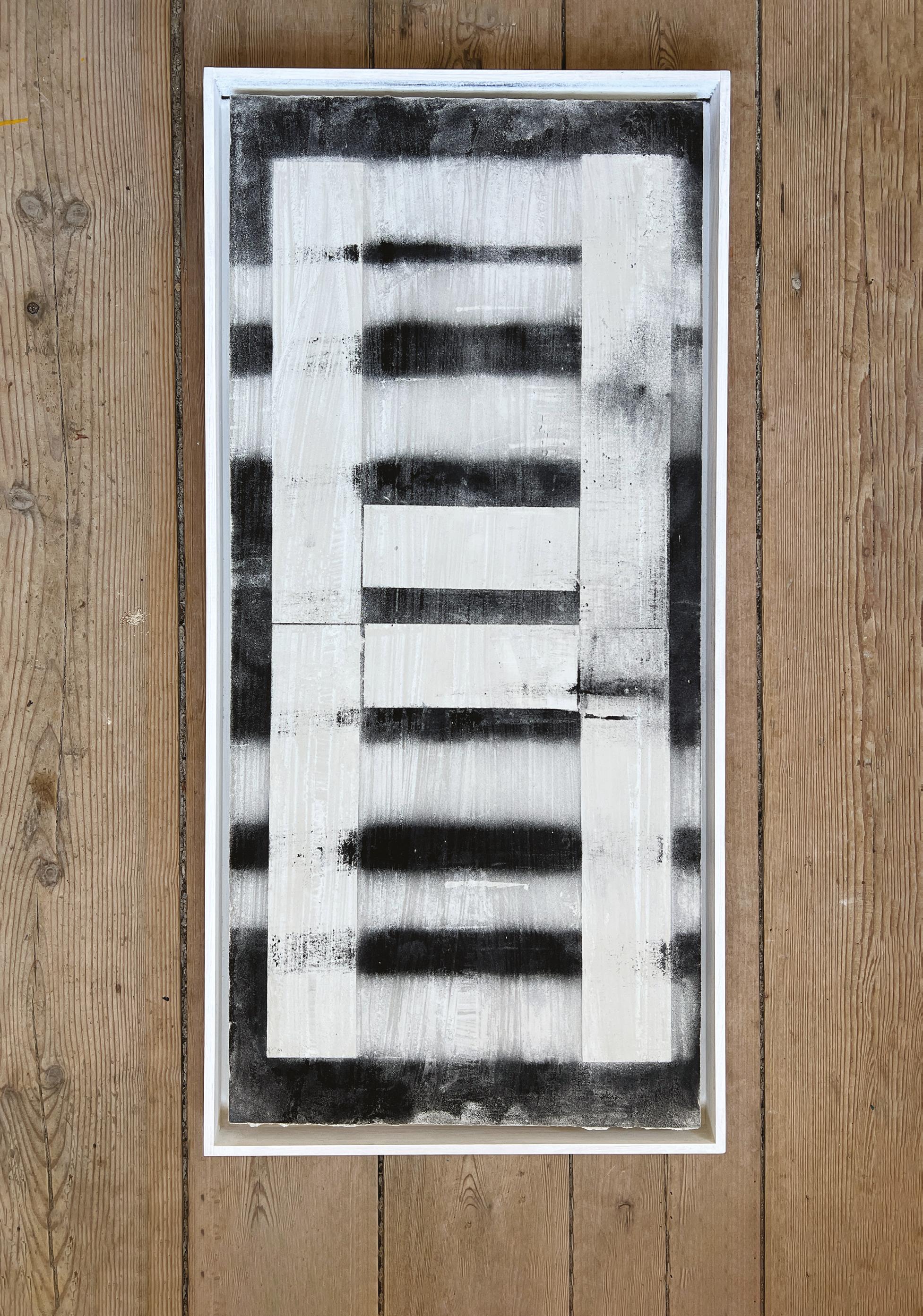 37/ How It Comes Out, Weather Changes, Wall Piece V, 2023, mixed media, H75 x W36 cm
37/ How It Comes Out, Weather Changes, Wall Piece V, 2023, mixed media, H75 x W36 cm
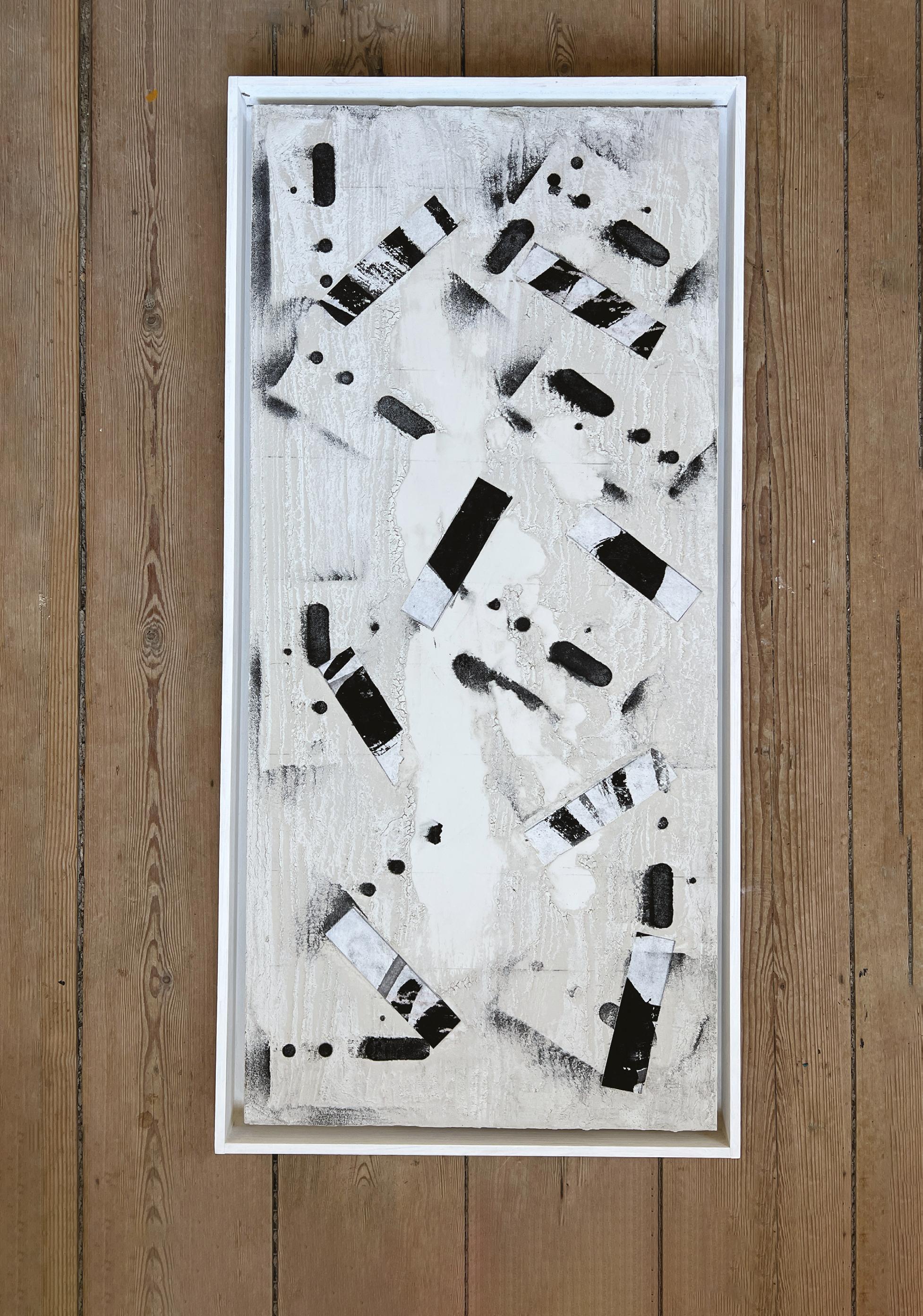 38/ How It Comes Out, Weather Changes, Wall Piece II, 2023, mixed media, H75 x W36 cm
38/ How It Comes Out, Weather Changes, Wall Piece II, 2023, mixed media, H75 x W36 cm
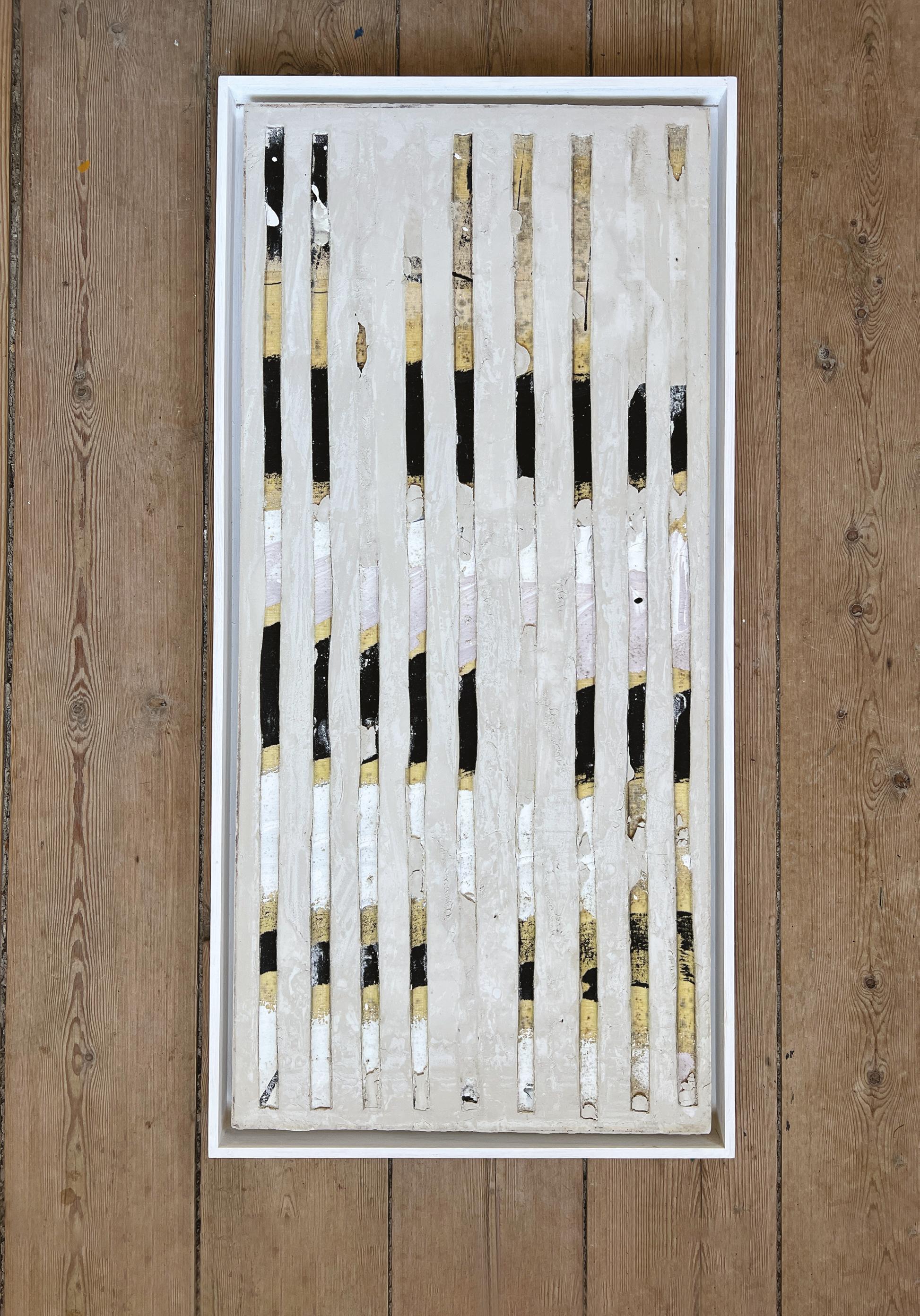 39/ How It Comes Out, Weather Changes, Wall Piece III, 2023, mixed media, H75 x W36 cm
39/ How It Comes Out, Weather Changes, Wall Piece III, 2023, mixed media, H75 x W36 cm
 40/ How It Comes Out, Weather Changes, Wall Piece I, 2023, mixed media, H75 x W36 cm
40/ How It Comes Out, Weather Changes, Wall Piece I, 2023, mixed media, H75 x W36 cm
Born 1943, Copenhagen, Denmark
1961–65 Arts and Crafts School, Copenhagen
1966 Escuela de Diseño y Artesanias, Mexico City, Mexico Art Department, Berkeley University, California
Selected Solo Exhibitions
2023 Bodil Manz at 80, The Scottish Gallery, Edinburgh, UK
2022 Galleri Køppe, Rønne, Denmark
Galleri Weinberger Schandorff, Denmark
2021 Enter Art Fair Copenhagen, Denmark
2012 Galleri Weinberger, Copenhagen, Denmark
2011 Galleri Pagter, Kolding, Denmark
2008 Designmuseum Denmark, Copenhagen
2006 Galerie Pierre, Paris, France
Ann Linnemann Gallery, Copenhagen, Denmark The Scottish Gallery, Edinburgh, UK
Pioneering Women, Oxford Ceramics Gallery, UK
Loewe Foundation Craft Prize
Hostler Burrows Gallery, New York, USA
2020 Korean Craft Museum, South Korea
2019 Galerie du Don, Le Fel, France
Oxford Ceramics Gallery, UK
Garth Clark Gallery, New York, USA
2005 Puls Contemporary Ceramics, Brussels, Belgium
Galerie Besson, London, UK
2004 Galerie Nørby, Copenhagen, Denmark
2003 Galerie b 15, Munich, Germany
Garth Clark Gallery, New York, USA
Berg Gallery, Stockholm, Sweden Galerie Carla Koch, Amsterdam, The Netherlands
Peters Project Gallery, Santa Fe, USA, with Cecilie Manz
Biennale for Kunsthåndværk & Design, Denmark
Oxford Ceramics Gallery, Collect, London, UK
2018 LVS Gallery, Seoul, South Korea
2002 Puls Contemporary Ceramics, Brussels, Belgium
Galerie Carla Koch, Amsterdam, The Netherlands
2001 Garth Clark Gallery, New York, USA
2000 Galerie Carla Koch, Amsterdam, The Netherlands
CLAY Keramikmuseum, Middelfart, Denmark Galerie Nørby, Copenhagen, Denmark
The Ceramist, The Scottish Gallery, Edinburgh, UK
2017 Höganäs Museum, Sweden
2016 Johannes Larsen Museum, Kerteminde, Denmark
1998 Galerie Besson, London, UK
Garth Clark Gallery, New York, USA
1995 Nederlands Keramiekmuseum, Leeuwarden, The
2015 Galleri Weinberger, Copenhagen, Denmark Netherlands
2014 Time and Space: Bodil Manz, Ann Linnemann Gallery,
Copenhagen, Denmark
2013 Bodil Manz: Exploration of Form, Blackwell, The Arts
Garth Clark Gallery, New York, USA
1984 Lidköpings Konstall, Lidköping, Sweden
Facet, Bing & Grøndahl, Copenhagen, Denmark & Crafts House, Bowness-on-Windermere, UK
1971 Maison du Danemark, Paris, France
Selected Awards
2021 LOEWE Foundation Craft Prize Finalist
Selected Public Collections
Victoria and Albert Museum, London
2007 The 4th World Ceramic Biennale, Korea, Grand Prize The Danish Museum of Art & Design, Copenhagen
2005 The 3rd World Ceramic Biennale, Korea, The Danish Arts Foundation, Copenhagen
honourable mention
The New Carlsberg Foundation, Denmark
The 7th International, Ceramic Competition, Mino, Japan, Arts & Crafts & Furniture Design, Kolding, Denmark
honourable mention
2003 Knud V. Engelhardt’s Memorial Grant
The 2nd World Ceramic Biennale, Korea, Jury’s Prize
Bavarian State Prize, Germany
2002 Artist of the Year, West Zeeland, Denmark
2001 Anna Klindt Soerensen’s 2 year grant
Röhsska Konstslöjdmuseet, Gothenberg, Sweden
Nationalmuseum, Stockholm, Sweden
Musée de Sèvres, France
Musée des Arts Décoratifs, France
Kunstindustrimuseet, Helsinki, Finland
Pinakothek, Munich, Germany
The 6th International Ceramic Competition, Mino, Japan Museum für Kunst und Gewerbe, Hamburg, Germany
honourable mention
Sammlung Rudolf Strasser, Museum der Stadt, The 1st World Ceramic Biennale, Korea, Special Prize Landshut, Germany
The Thorval Bindesboell Medal
Keramikmuseum Westerwald, Höhr-Grenzjausen, Germany
2000 C.L. David’s Fund Carl Jacobsen’s Travel Grant, The New Museum Keramion, Frechen, Germany
Carlsberg Foundation Museum Boijmans-van Beuningen, Rotterdam, The Netherlands
1998 The Life Long Grant of the Danish Government Museum Het Princessehof, Leewarden,The Netherlands
The 5th International Ceramic Competition, Mino, Japan The Israel Museum, Jerusalem, Israel
Gold Medal Musée des Arts Décoratifs de Montreal, Canada
1997 Ellen and Knud Dahlhoff Larsen’s Foundation
Merchant L.F. Foght’s Foundation
Kutani International Decorative Ceramic Competition
Japan, Award of Merit
5th World Triennial Exhibition of Small Ceramics, Zagreb
Krapina Prize
1994 The Danish Arts Foundation, 3 year grant
1993
The Gardiner Museum of Ceramic Art, Toronto, Canada
Palmer Museum of Art, Pennsylvania, USA
Los Angeles County Museum of Art, USA
Seattle Art Museum, USA
The Houston Museum of Fine Arts, Texas, USA
Everson Museum, Syracuse, New York, USA
The Newark Museum, New Jersey, USA
4th World Triennial Exhibition of Small Ceramics, Zagreb Mint Museum of Craft and Design, Charlotte, USA
Grand Prix Spencer Museum, Lawrence, Kansas, USA
Arts, Crafts and Design Council’s Annual Prize Hallmark Collection, Kansas City, Missouri, USA
Johan S. Kroeir Foundation
Kay Bojesen and Mrs. Erna Bojesen Memorial Grant
1985 Ole Haslund’s Artist Grant
1978 Ole Haslund’s Artist Grant
1972 The Royal Copenhagen Porcelain Manufactory Jubilee Competition, Second Prize
1969 Den Permanente, Ceramic Competition, First Prize
The Cowi Foundation Handelsbanken Jubilee Grant
1968 The Danish Arts Foundation
Detroit Institute of Art, Michigan, USA
The Museum of Ceramic Art, Gifu, Japan
World Craft Forum, Tokyo, Japan
Taipei Fine Arts Museum, Taiwan
Published by The Scottish Gallery to coincide with the exhibition
BODIL MANZ AT 80
27 July - 26 AUGUST 2023
Exhibition can be viewed online at: scottish-gallery.co.uk/bodilmanz
ISBN: 978-1-912900-70-1
Designed and Produced by The Scottish Gallery
Photography: The Scottish Gallery
Portrait Photography: Erik Brahl
Introduction: © The Scottish Gallery
All rights reserved. No part of this catalogue may be reproduced in any form by print, photocopy or by any other means, without the permission of the copyright holders and of the publishers.
C ONTEMPORARY ART SINCE 18 42
16 DUNDAS STREET • EDINBURGH EH3 6HZ +44 (0) 131 558 1200 • mail@scottish-gallery.co.uk • scottish-gallery.co.uk
Front cover and inside cover
Bodil Manz’s studio, Hørve, Denmark, 2023
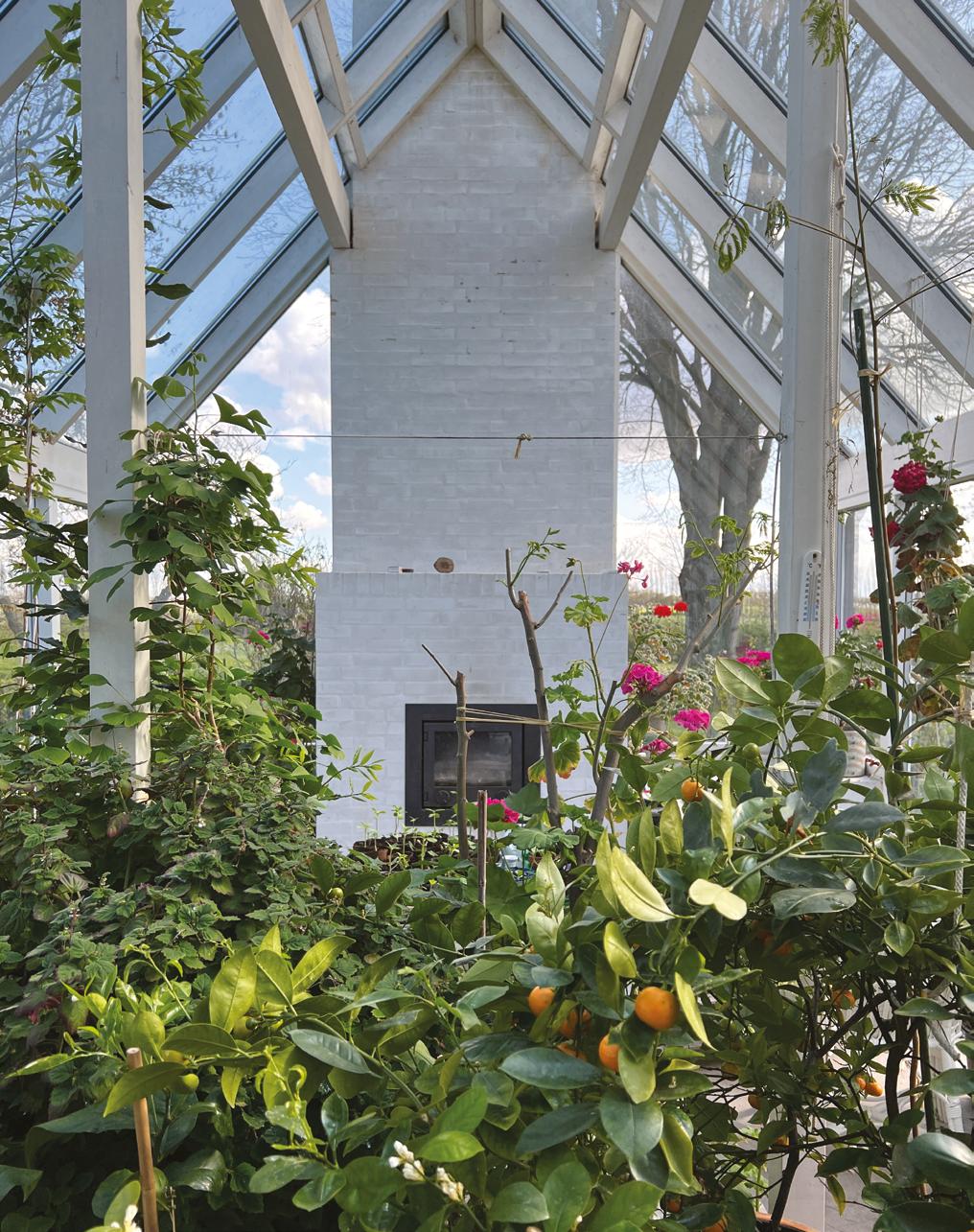
Back cover
14/ City I, 2023 (detail)
porcelain cylinder no 4
H15 x D19 cm

